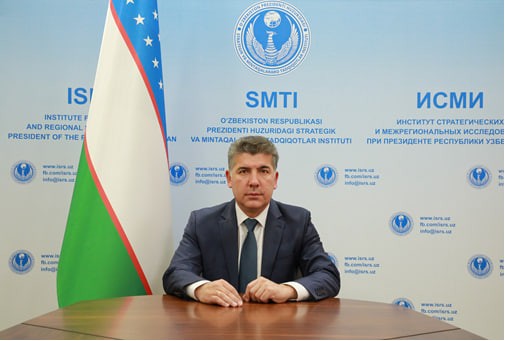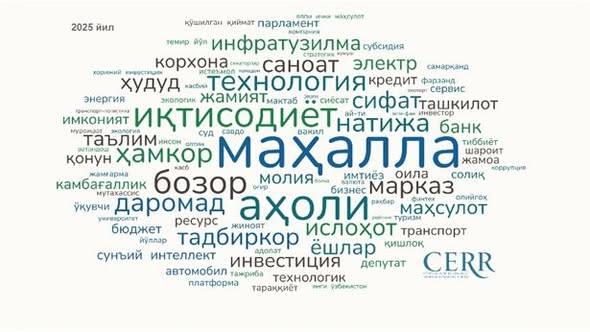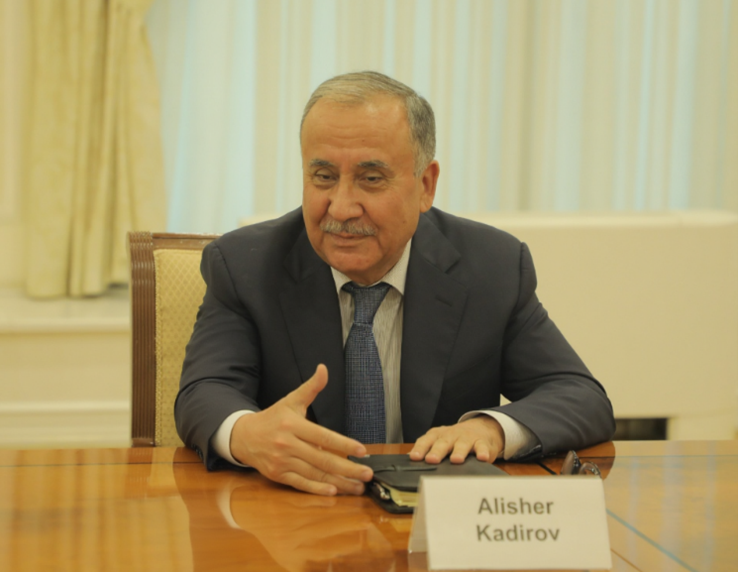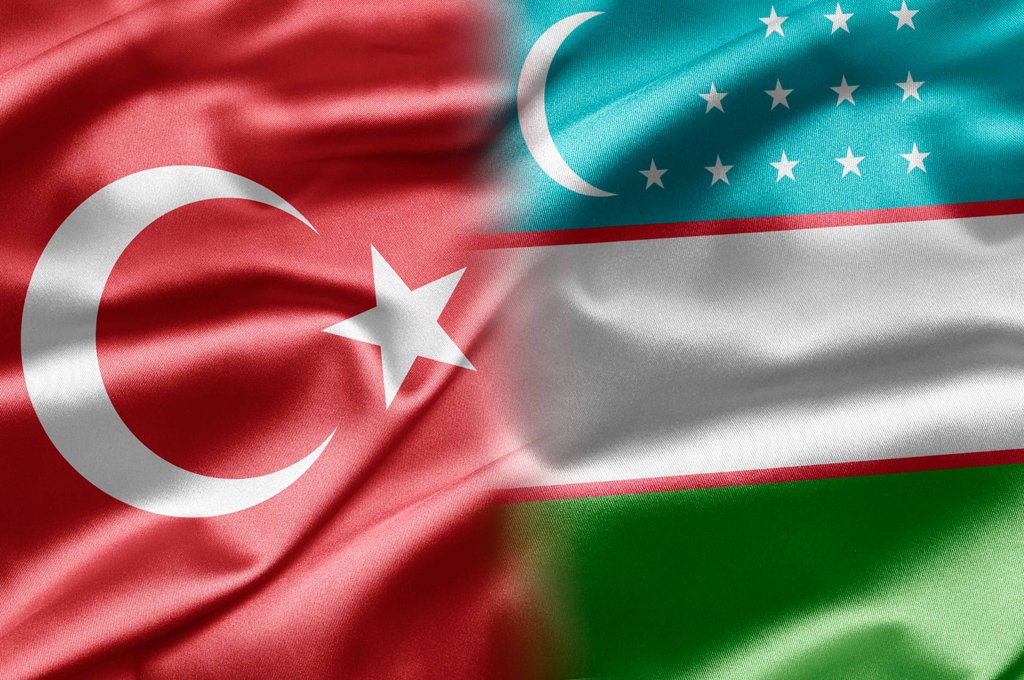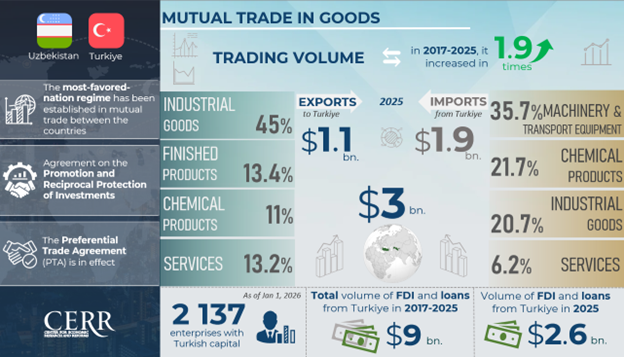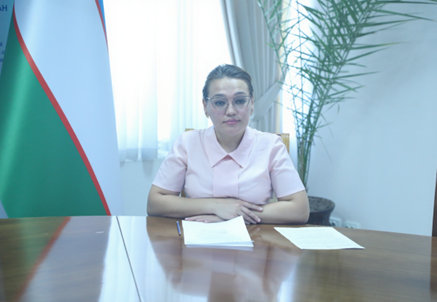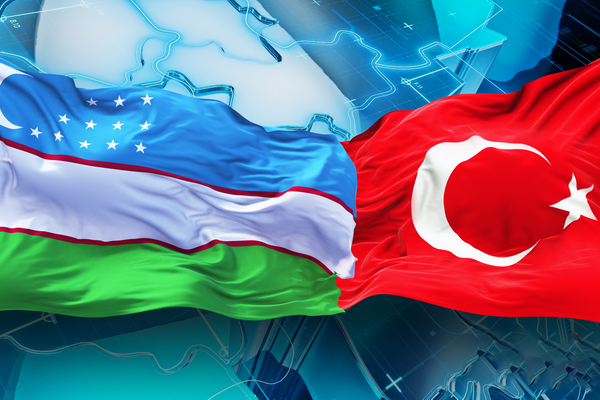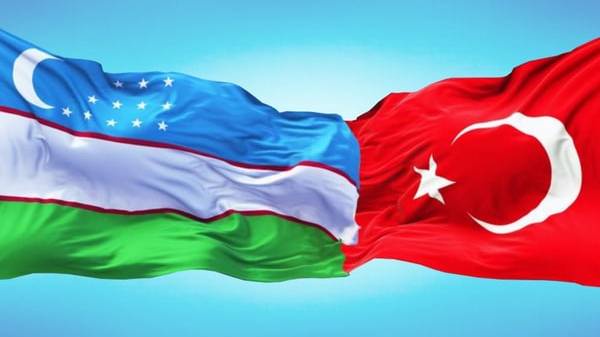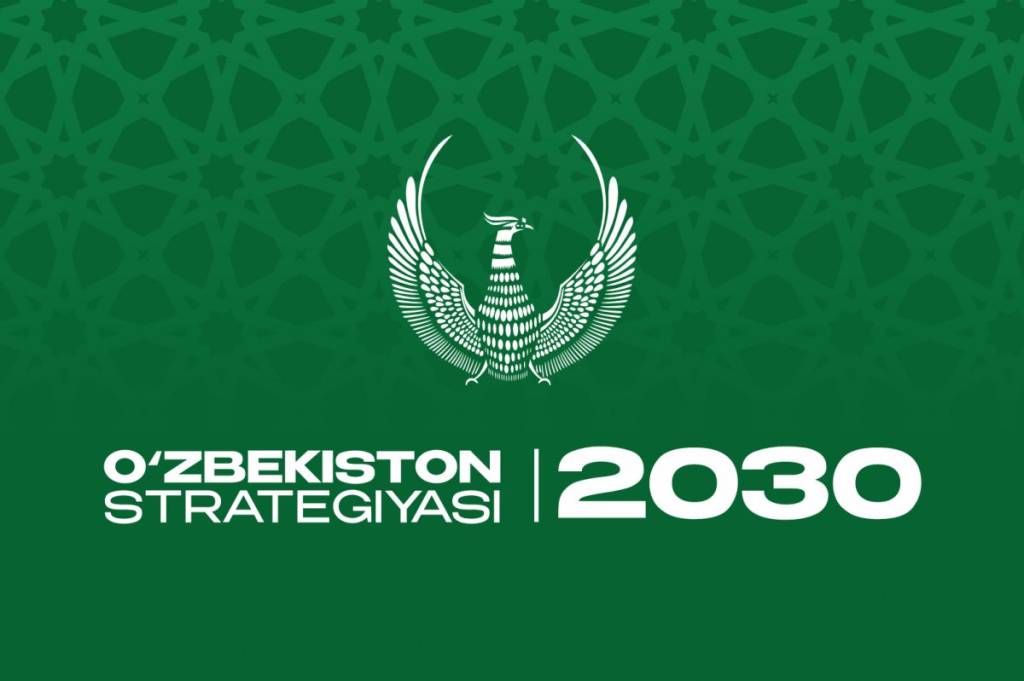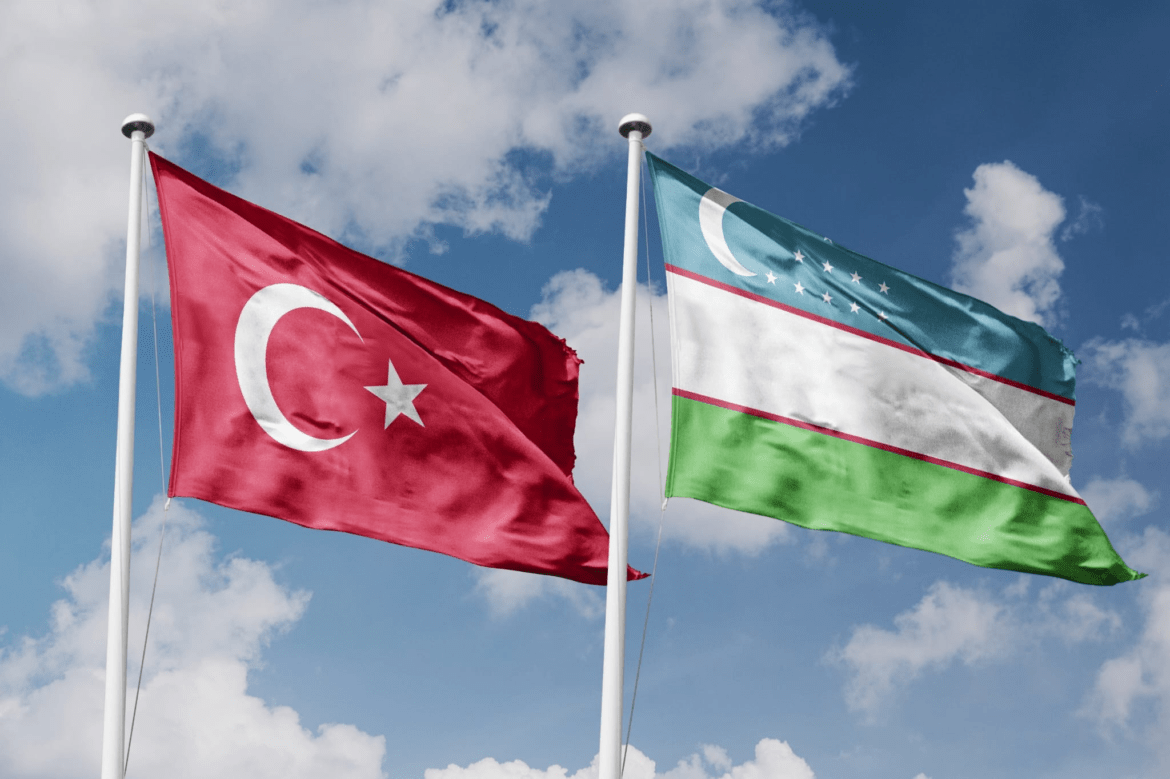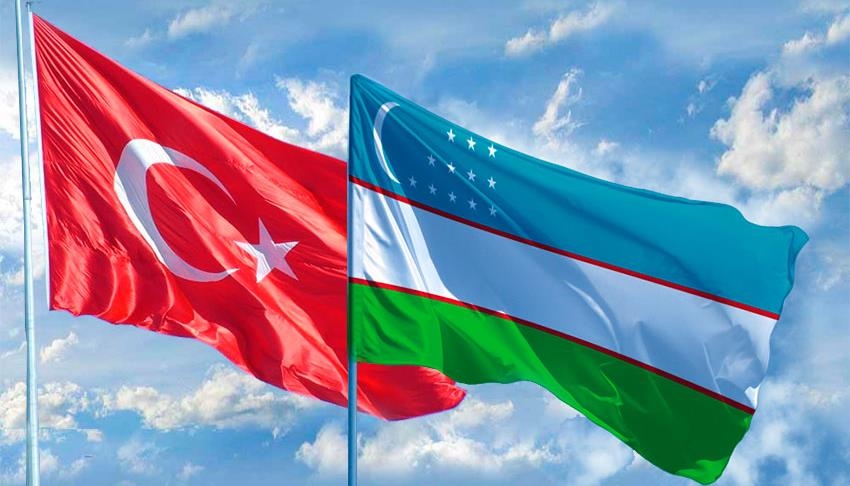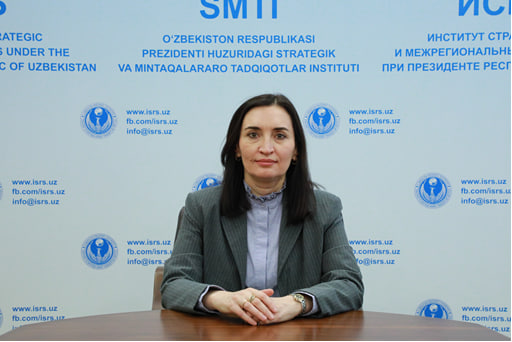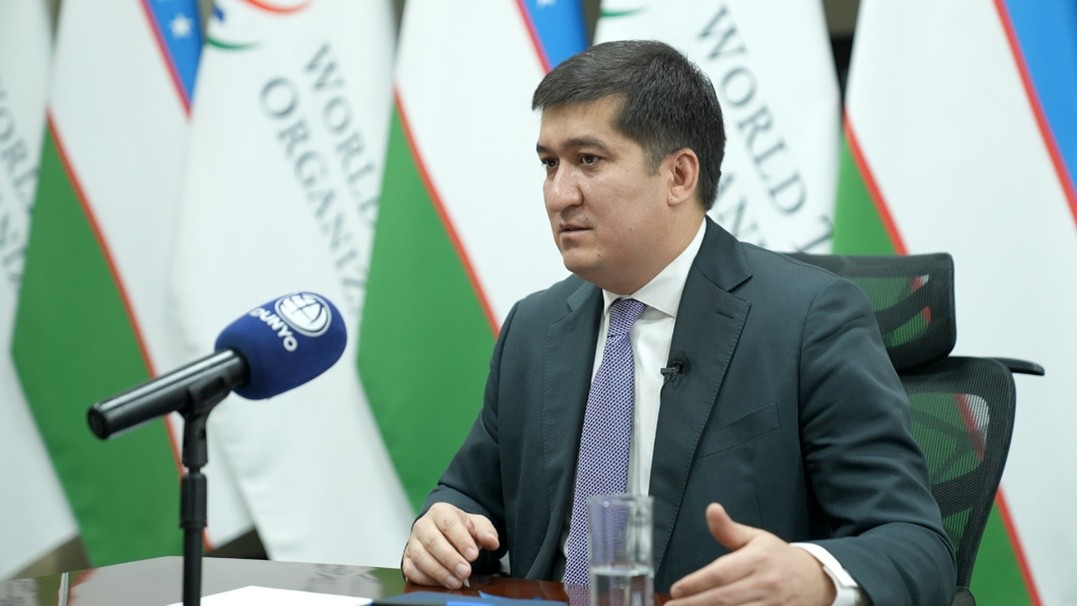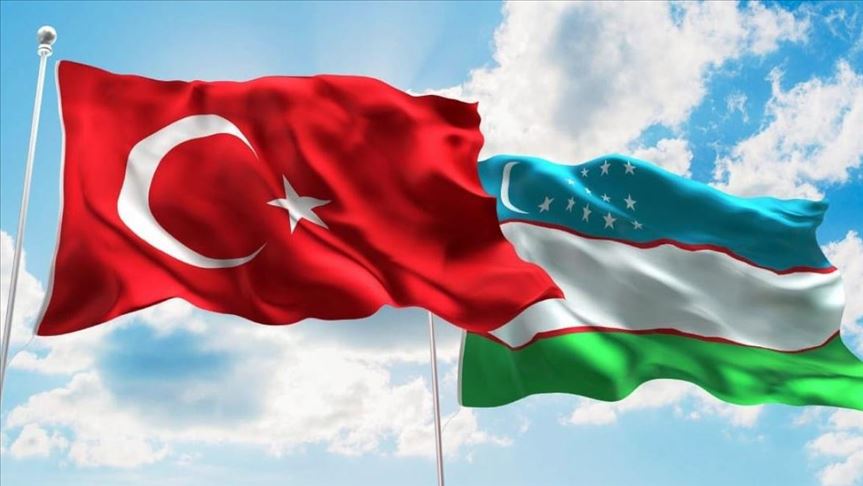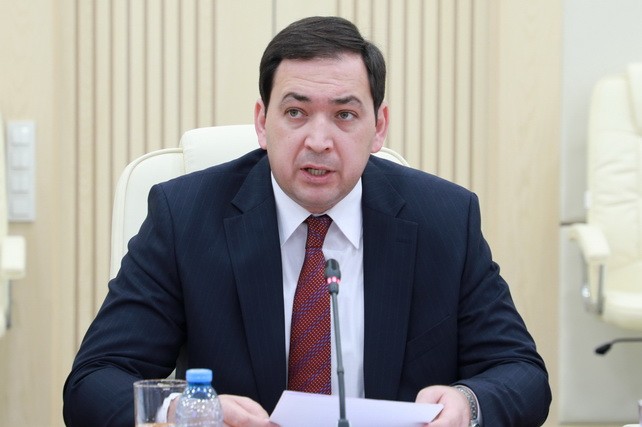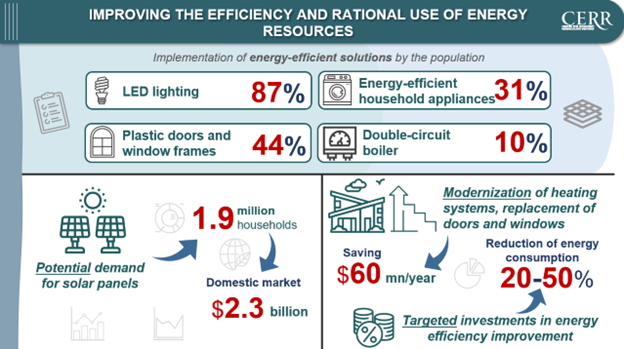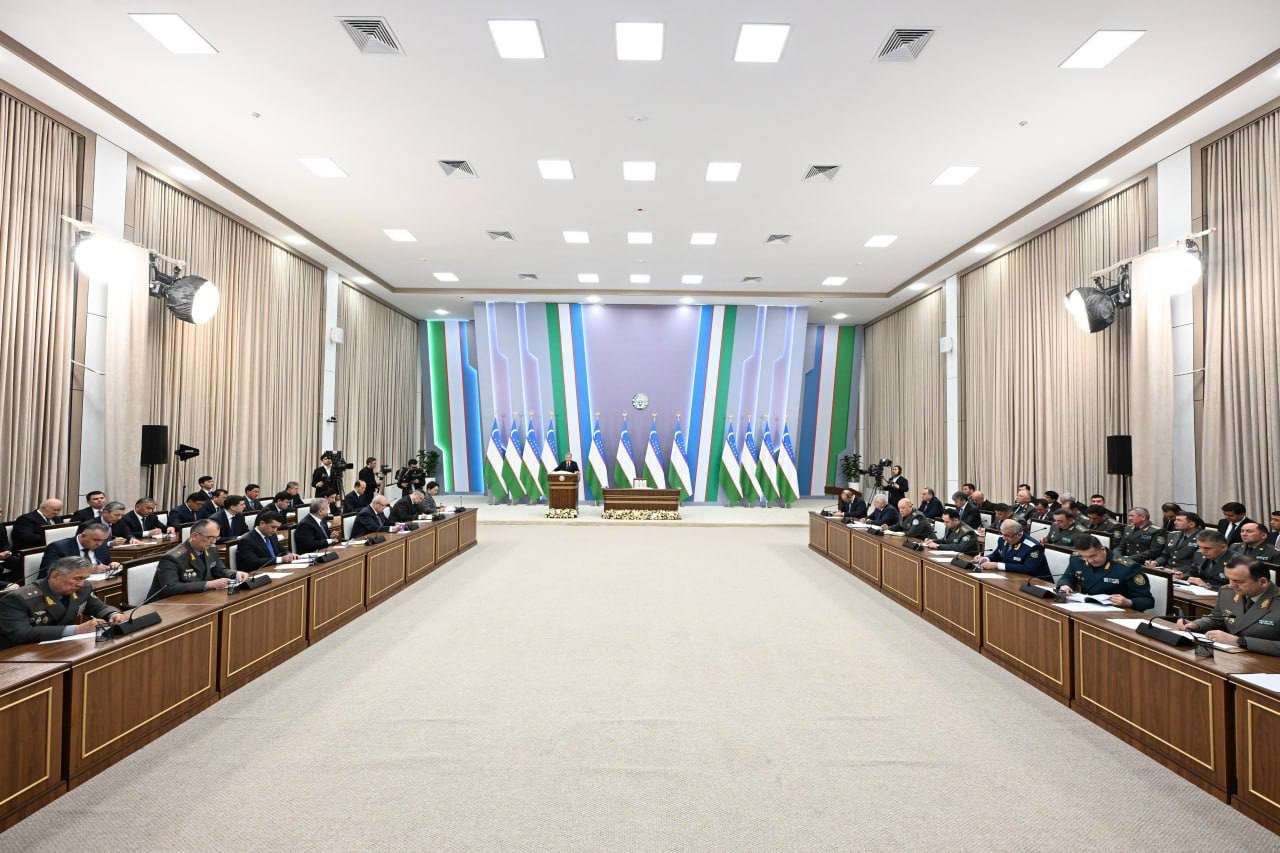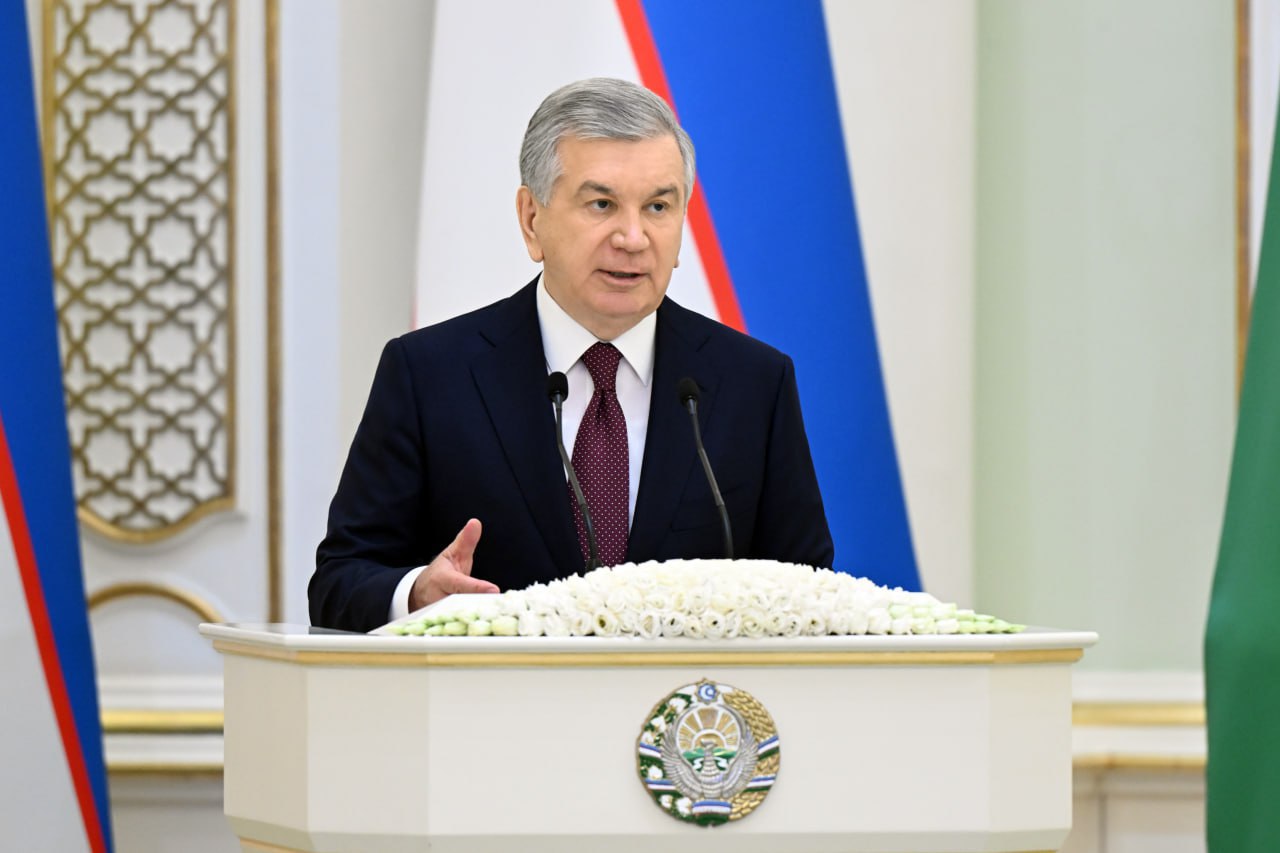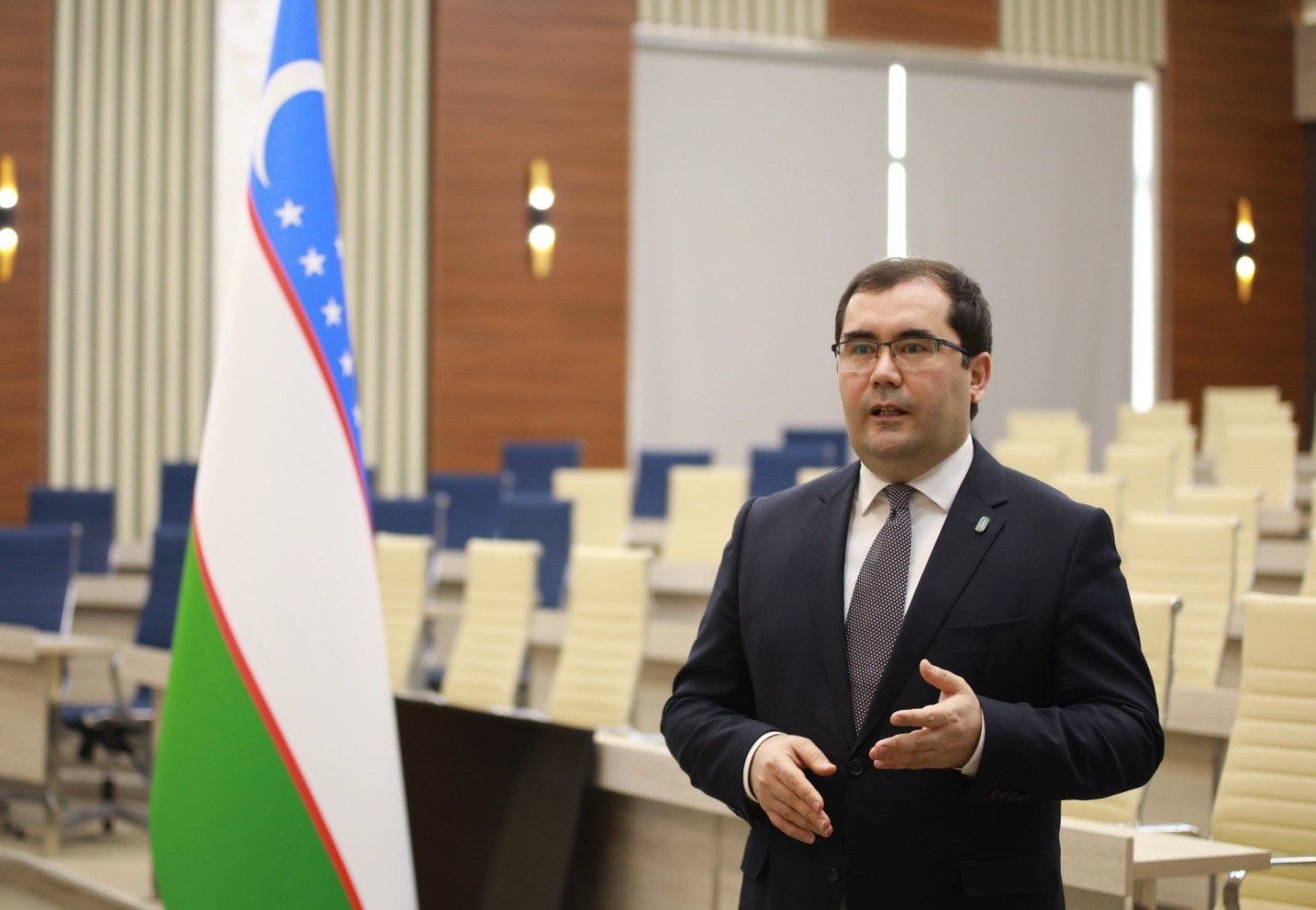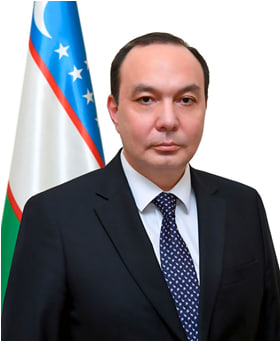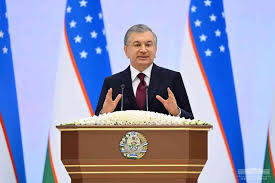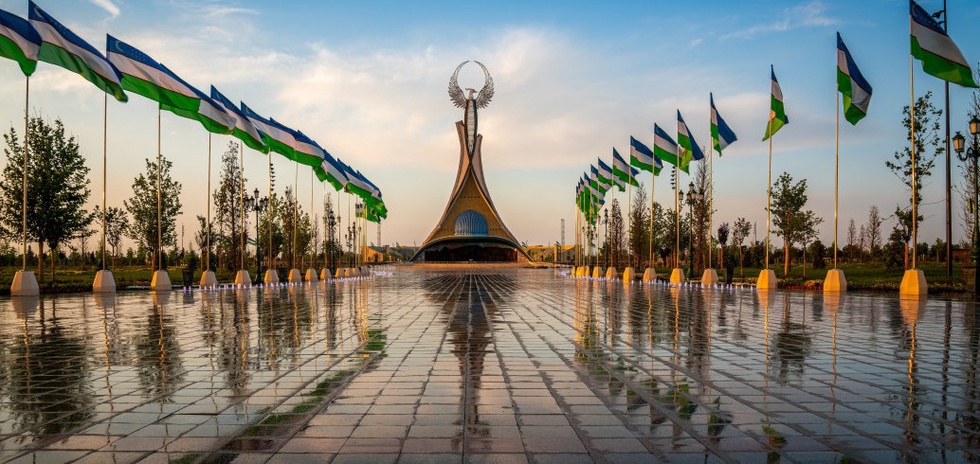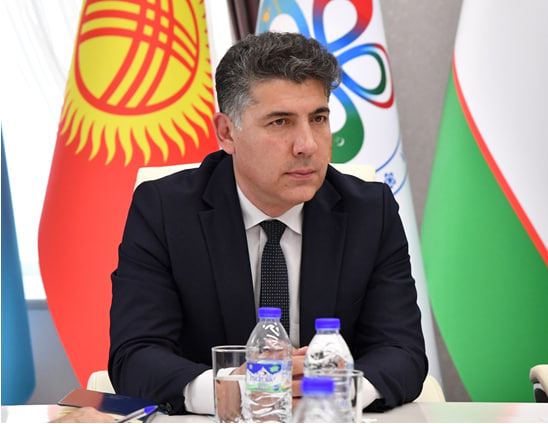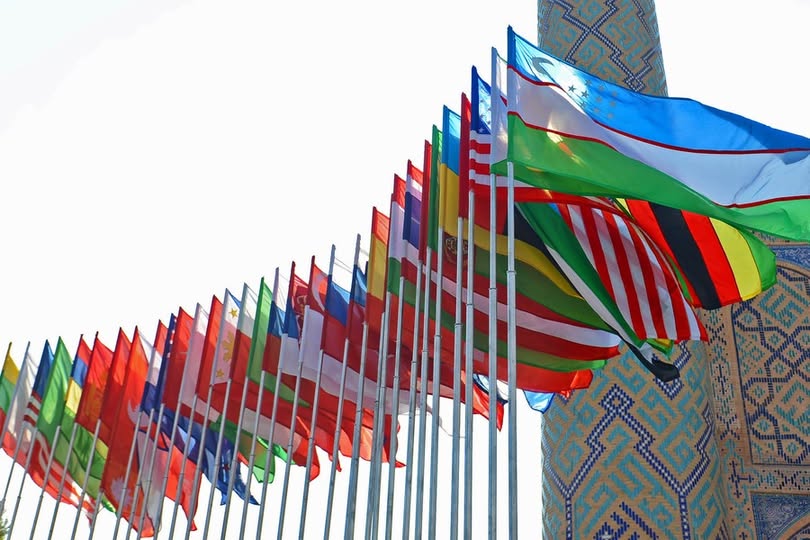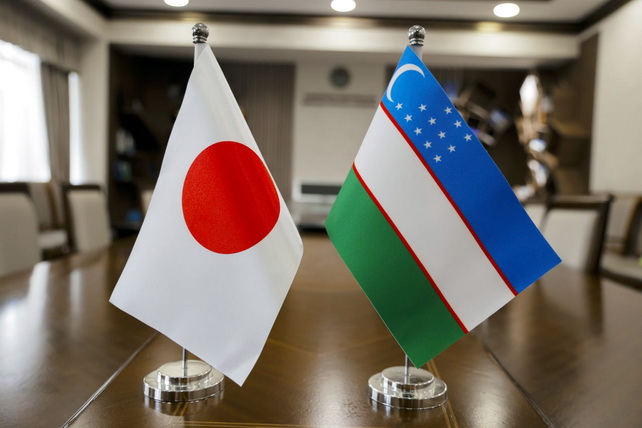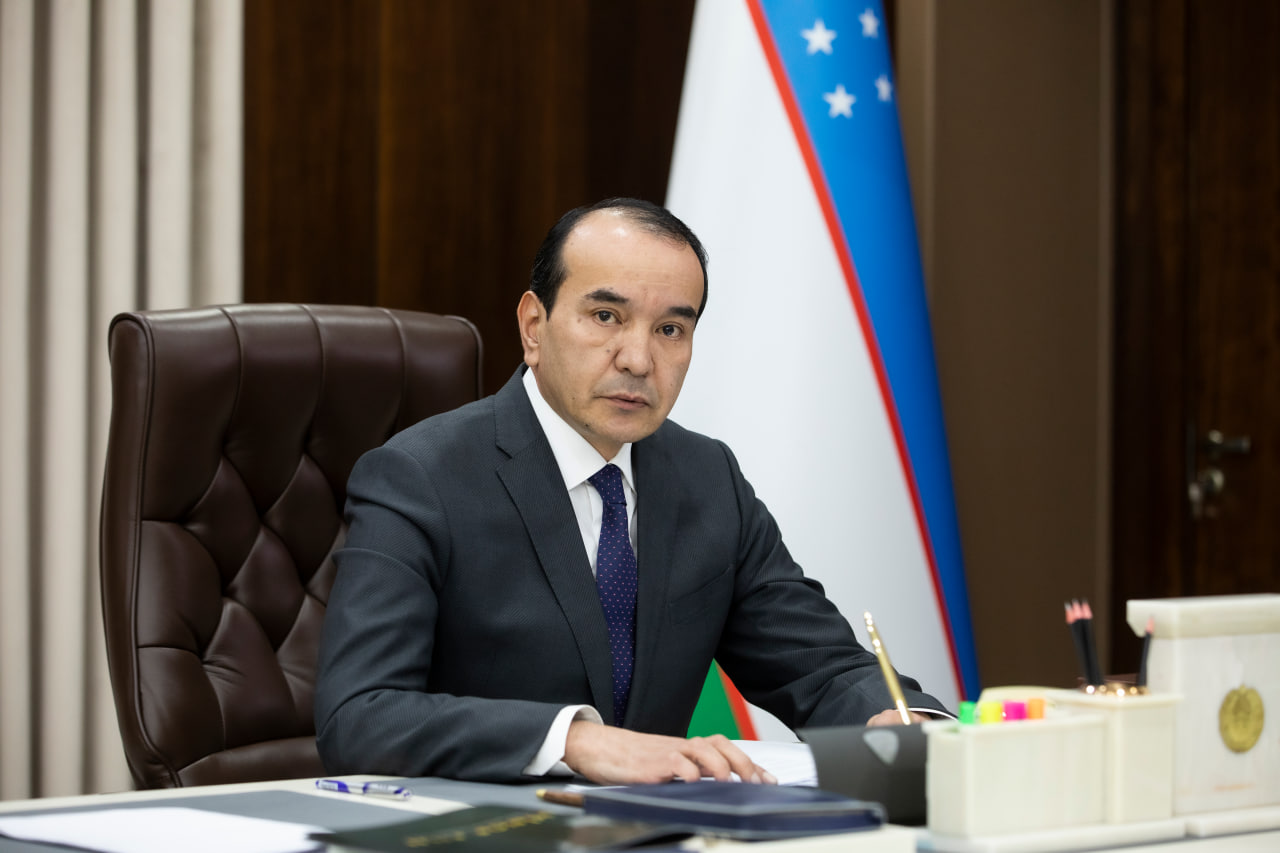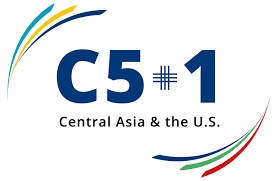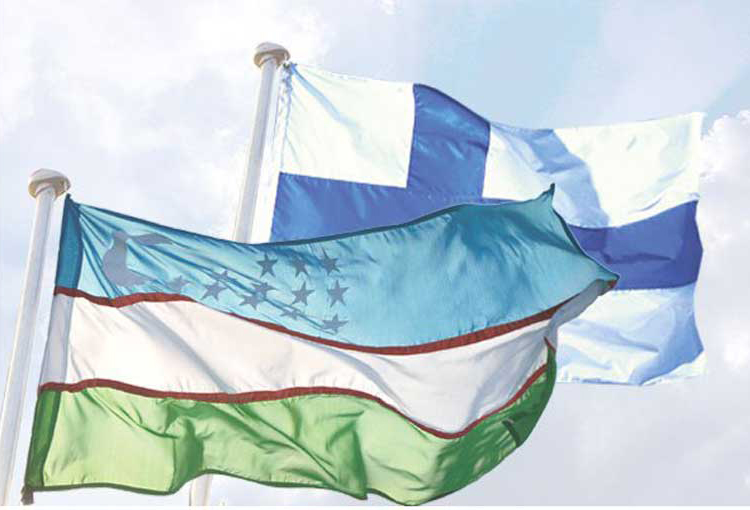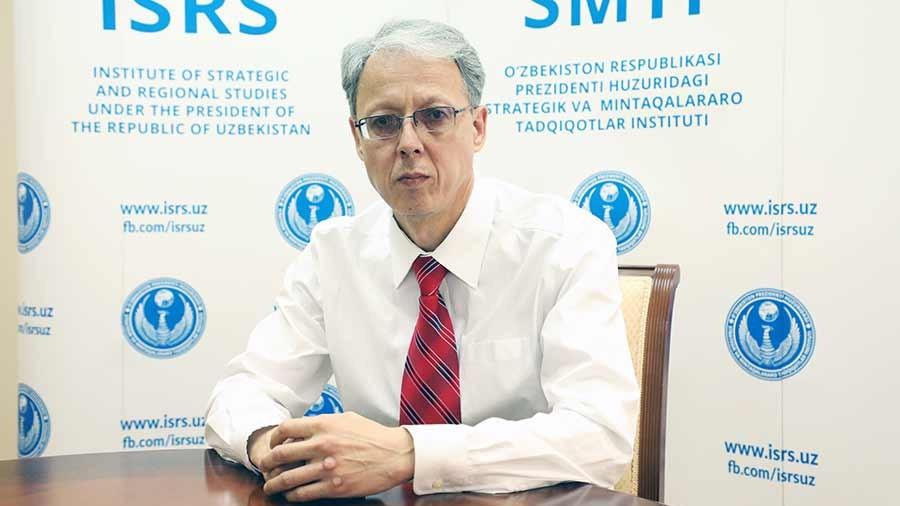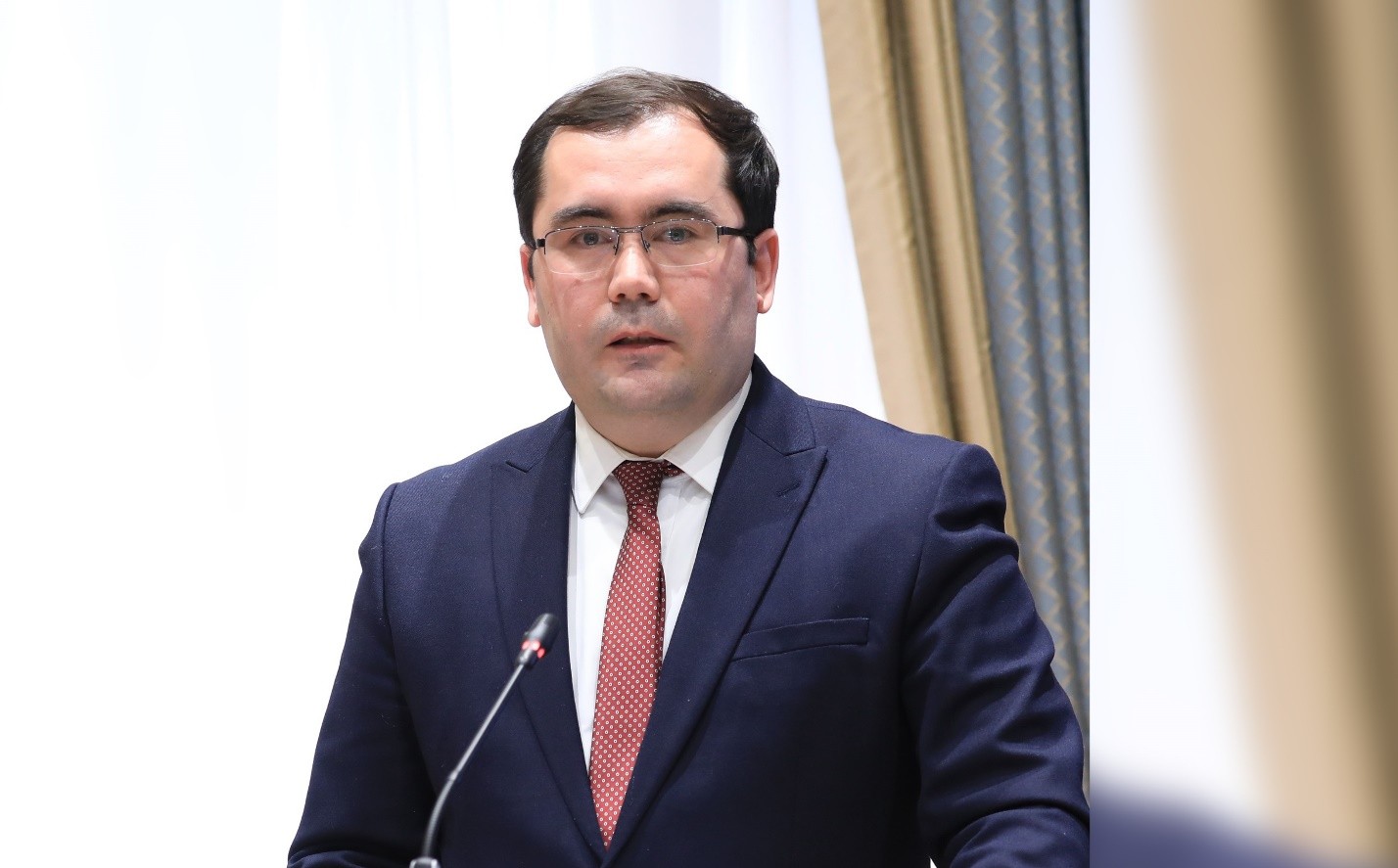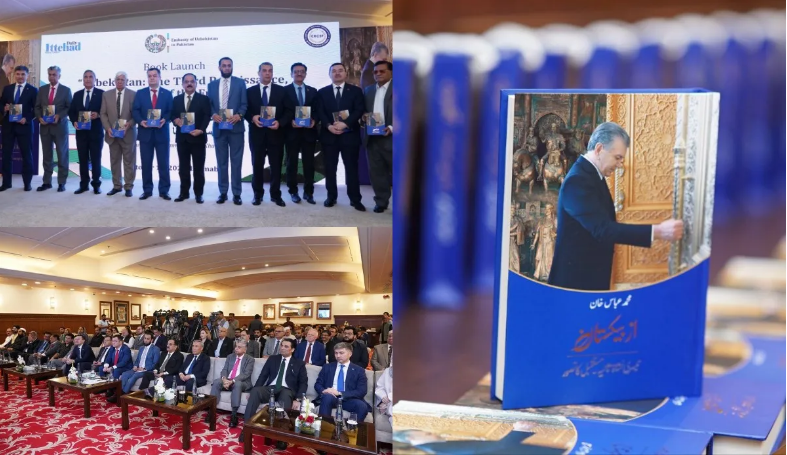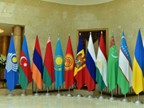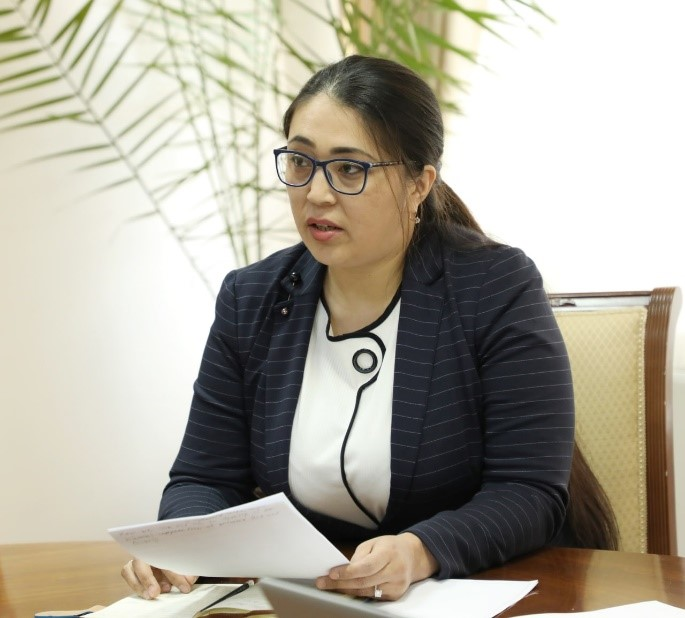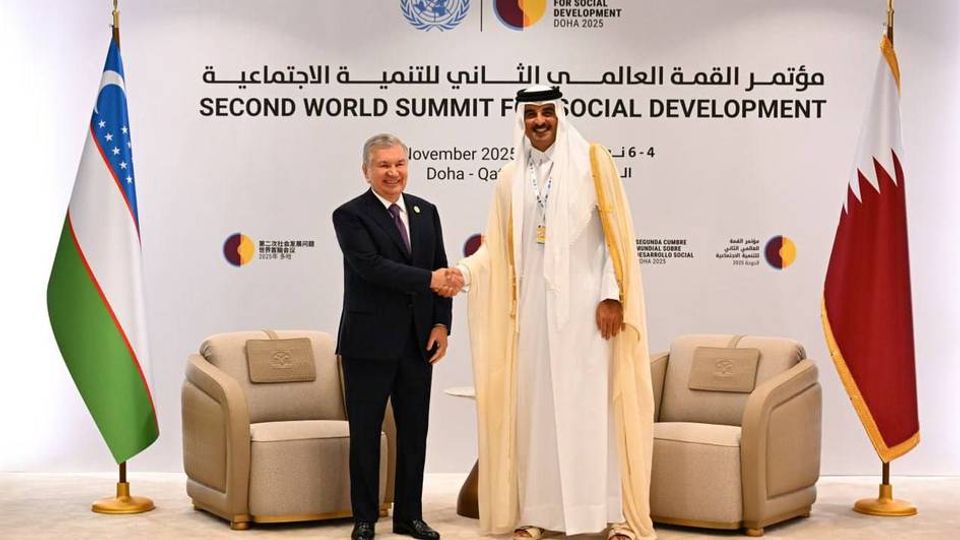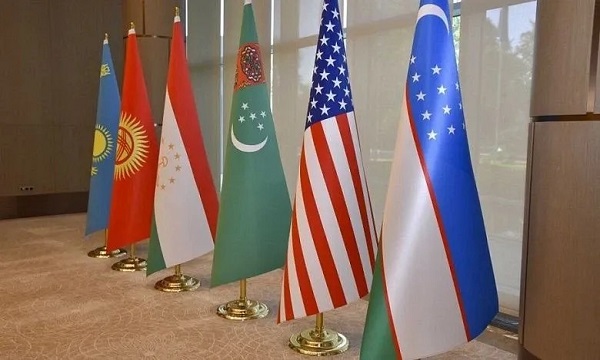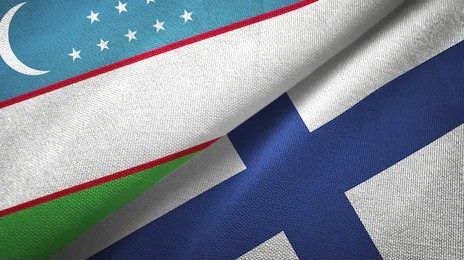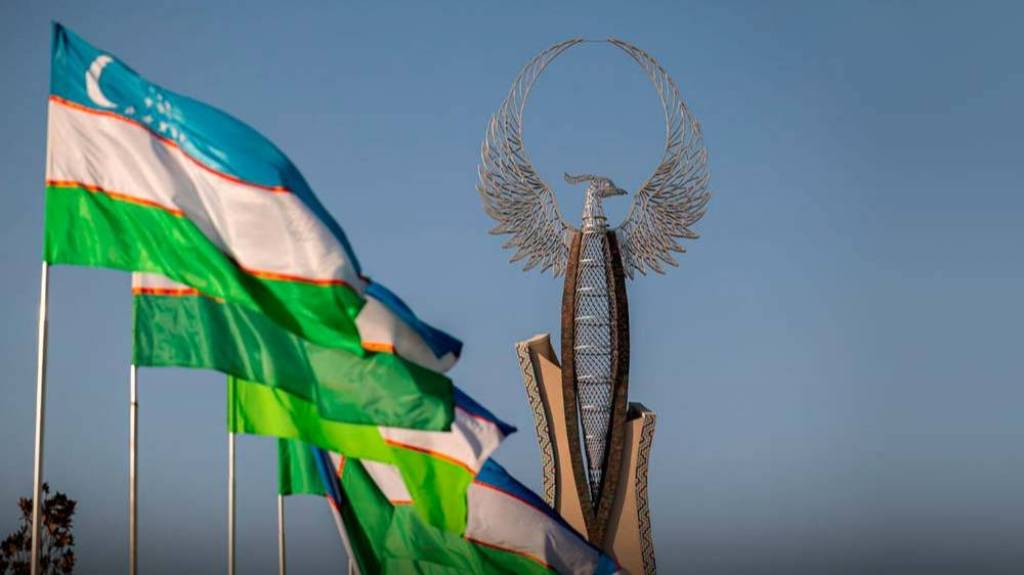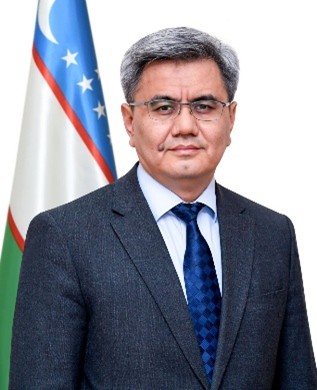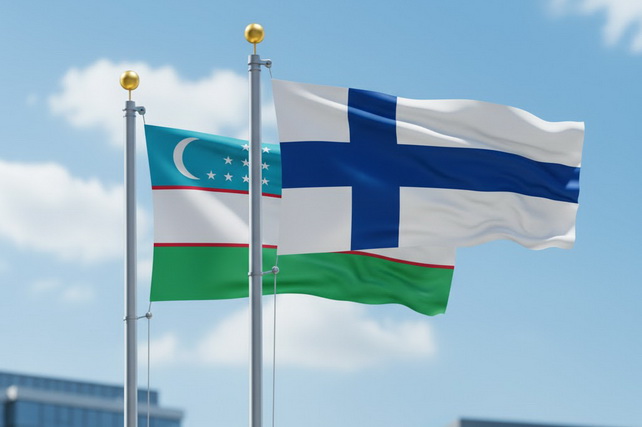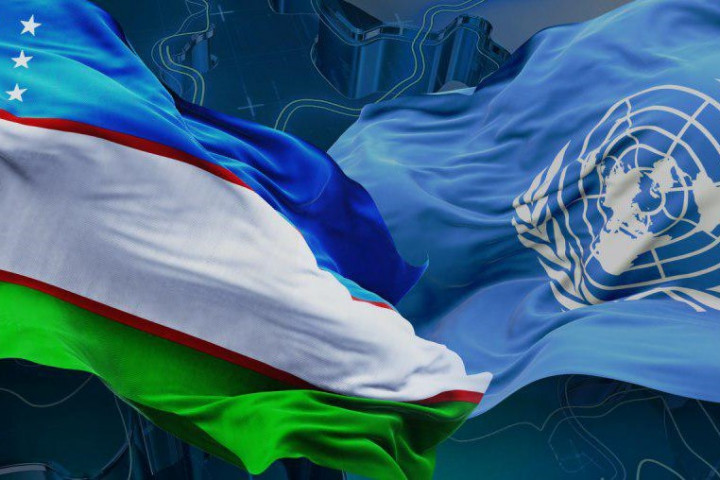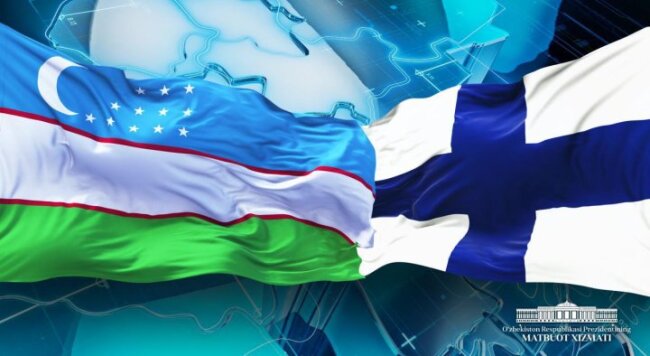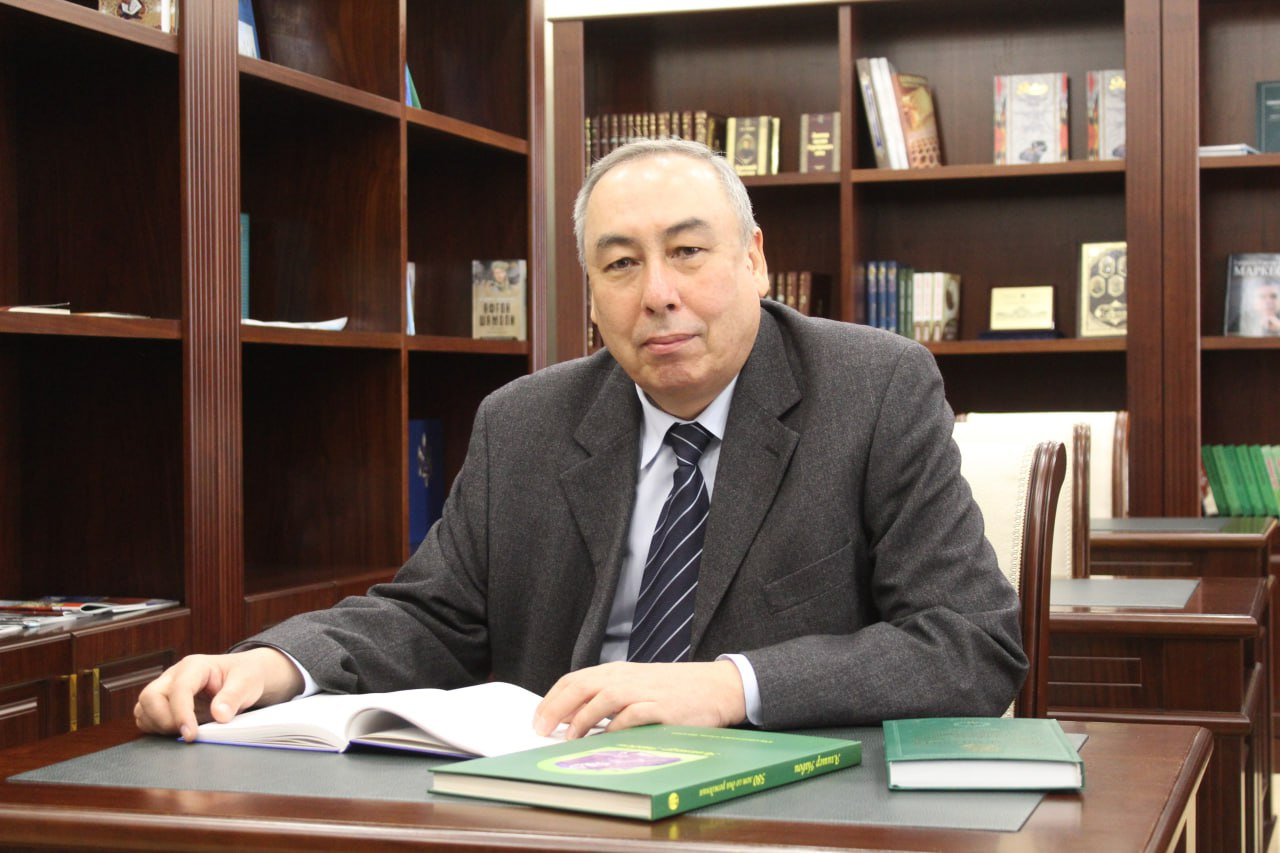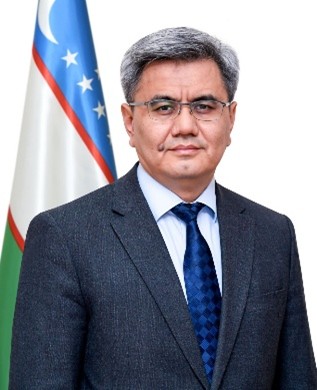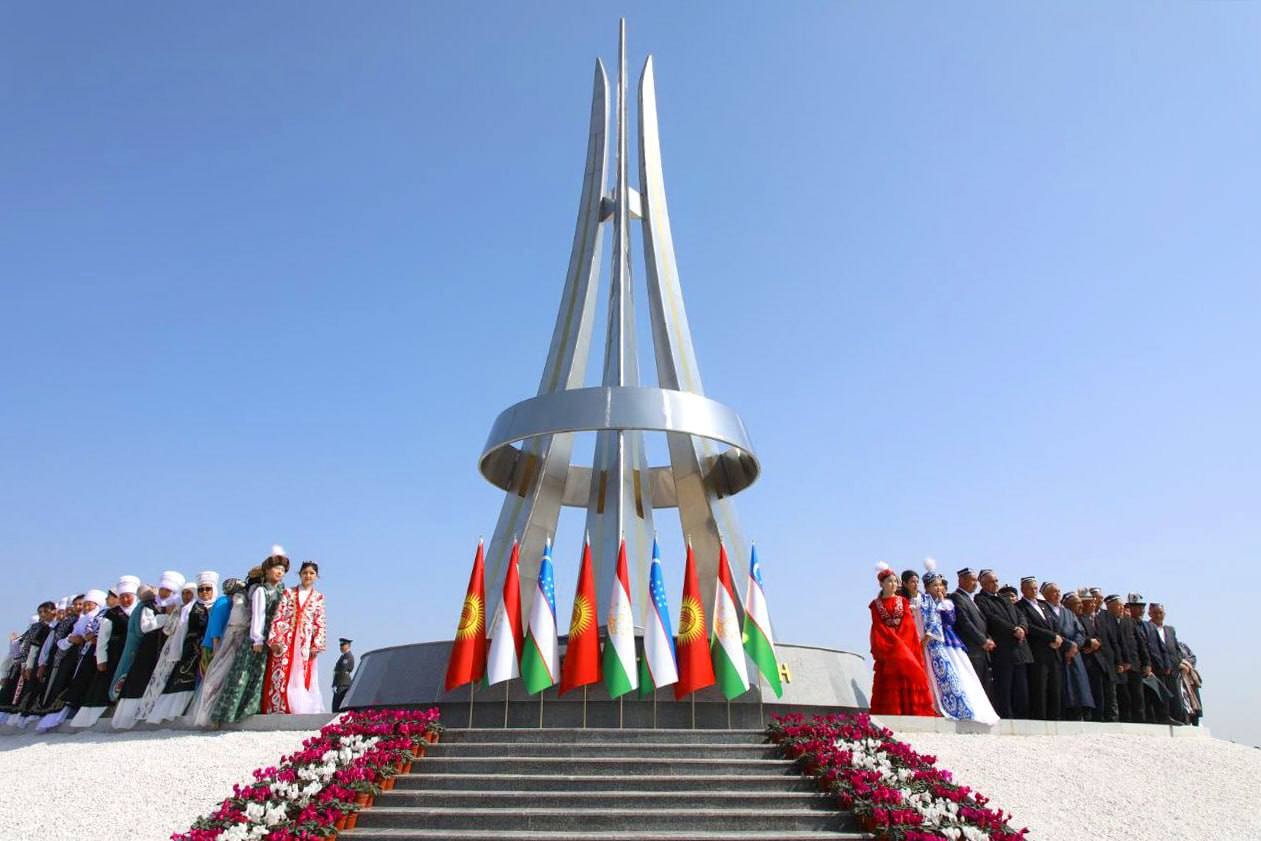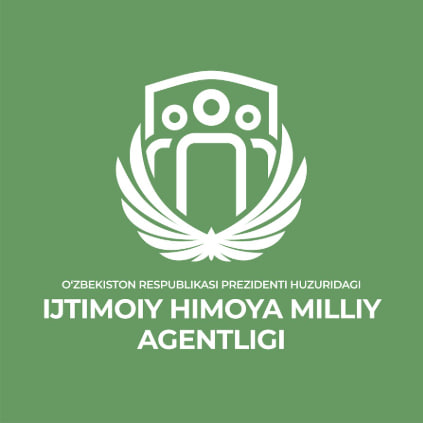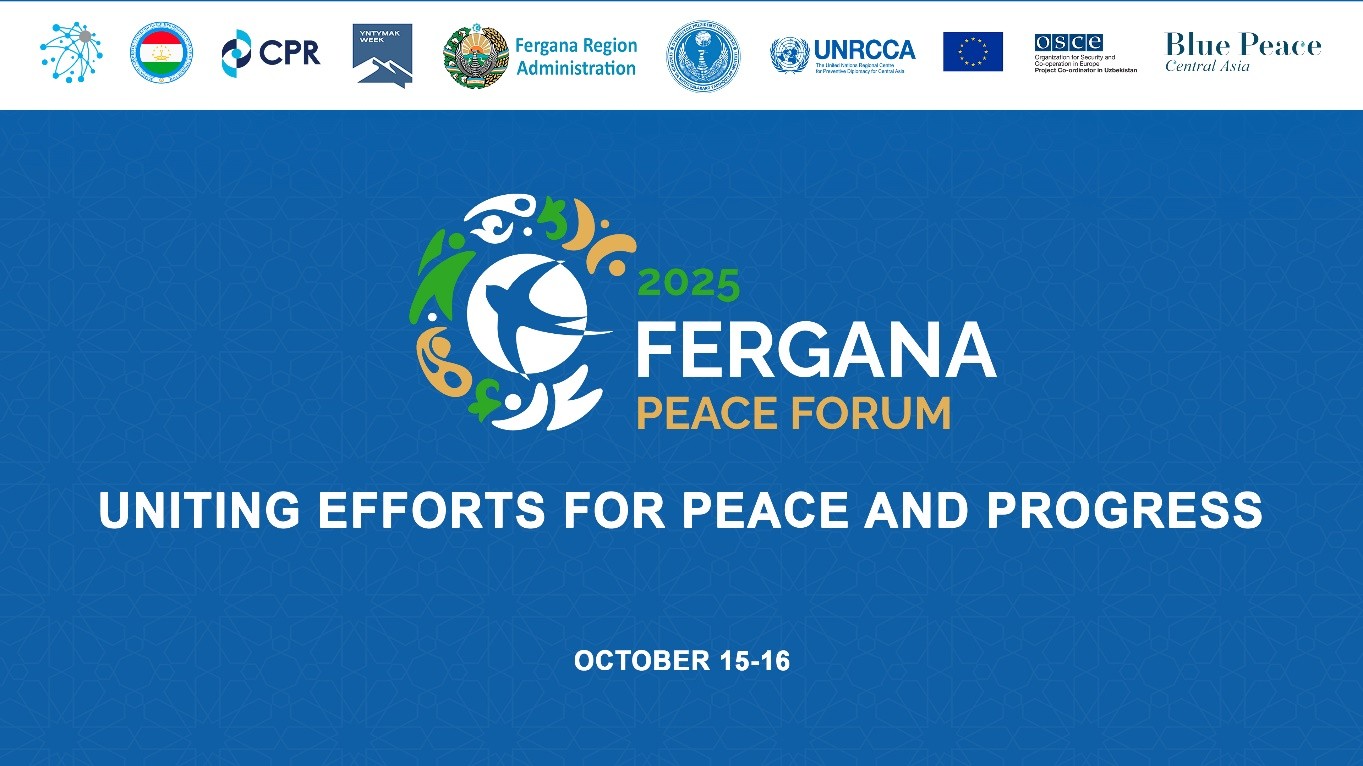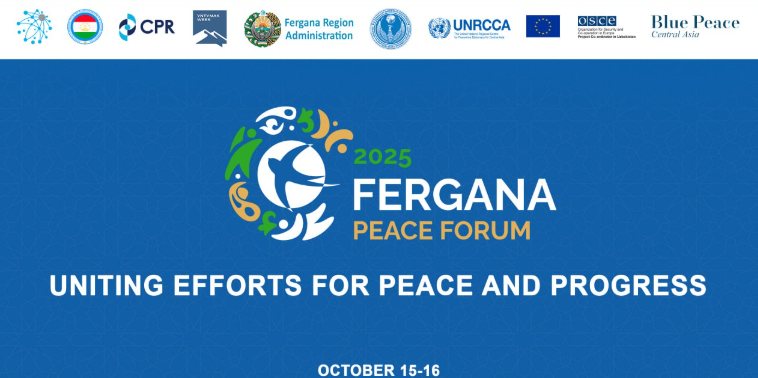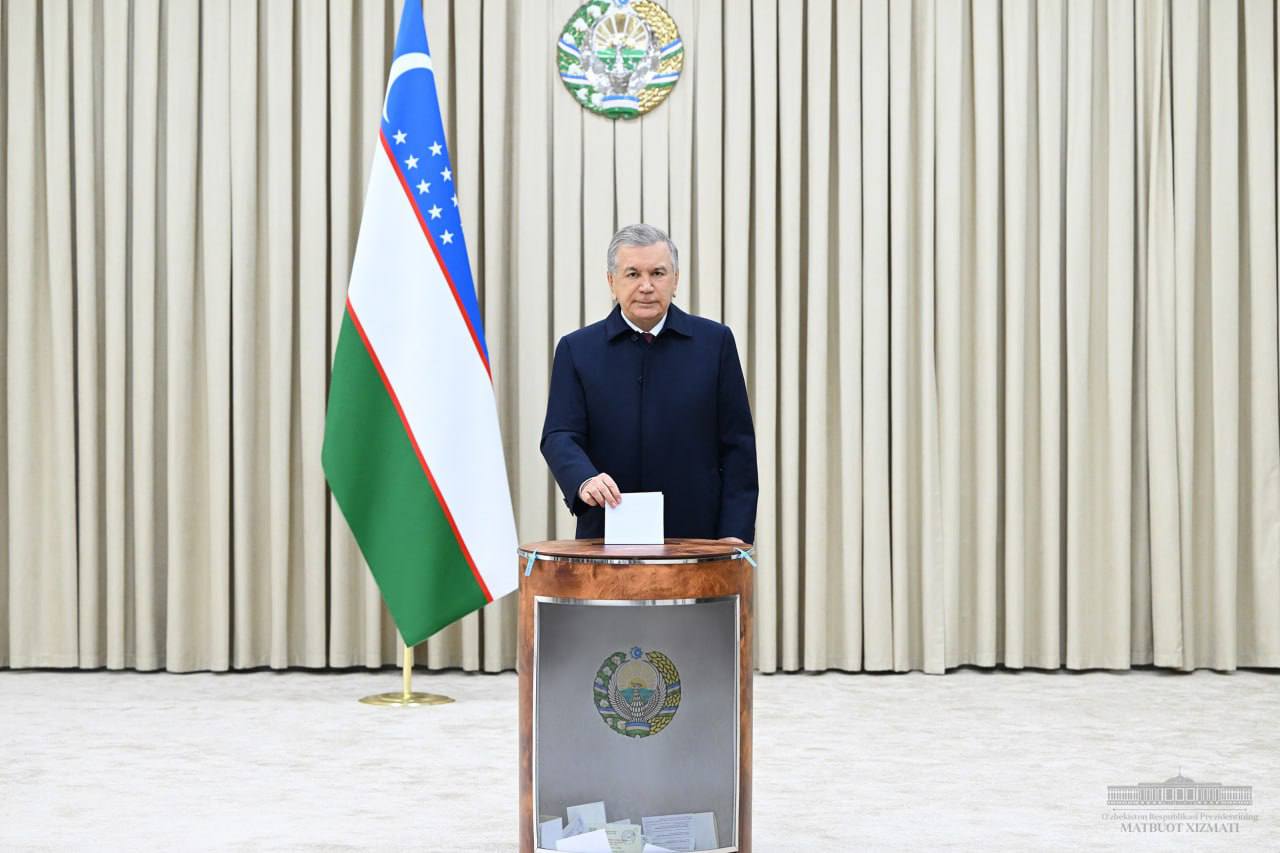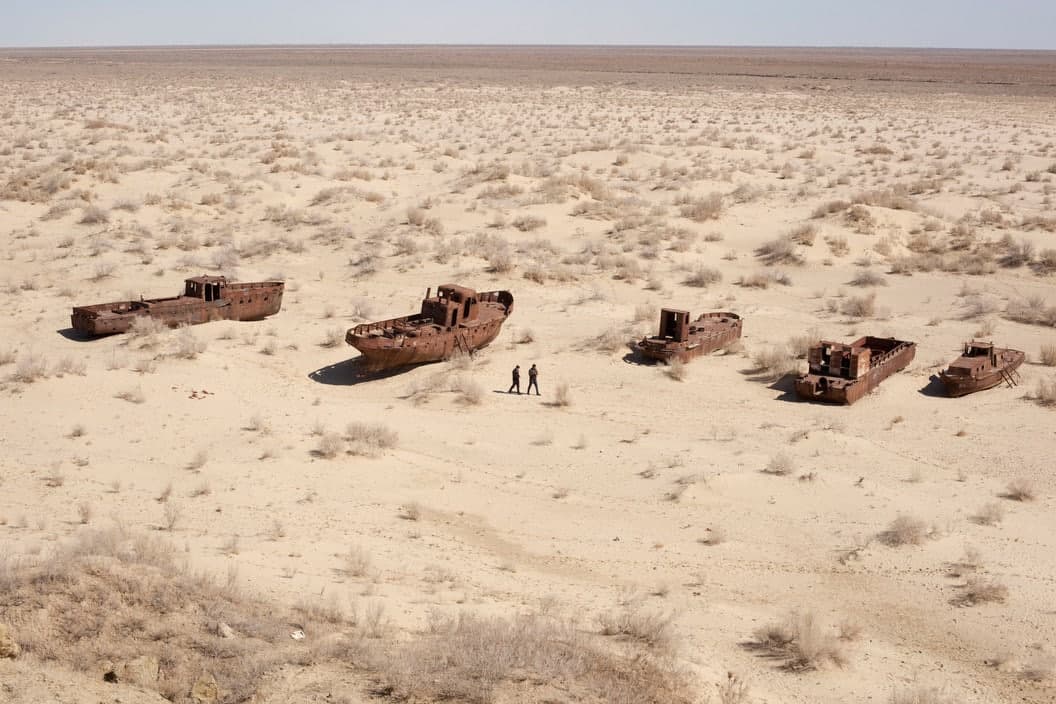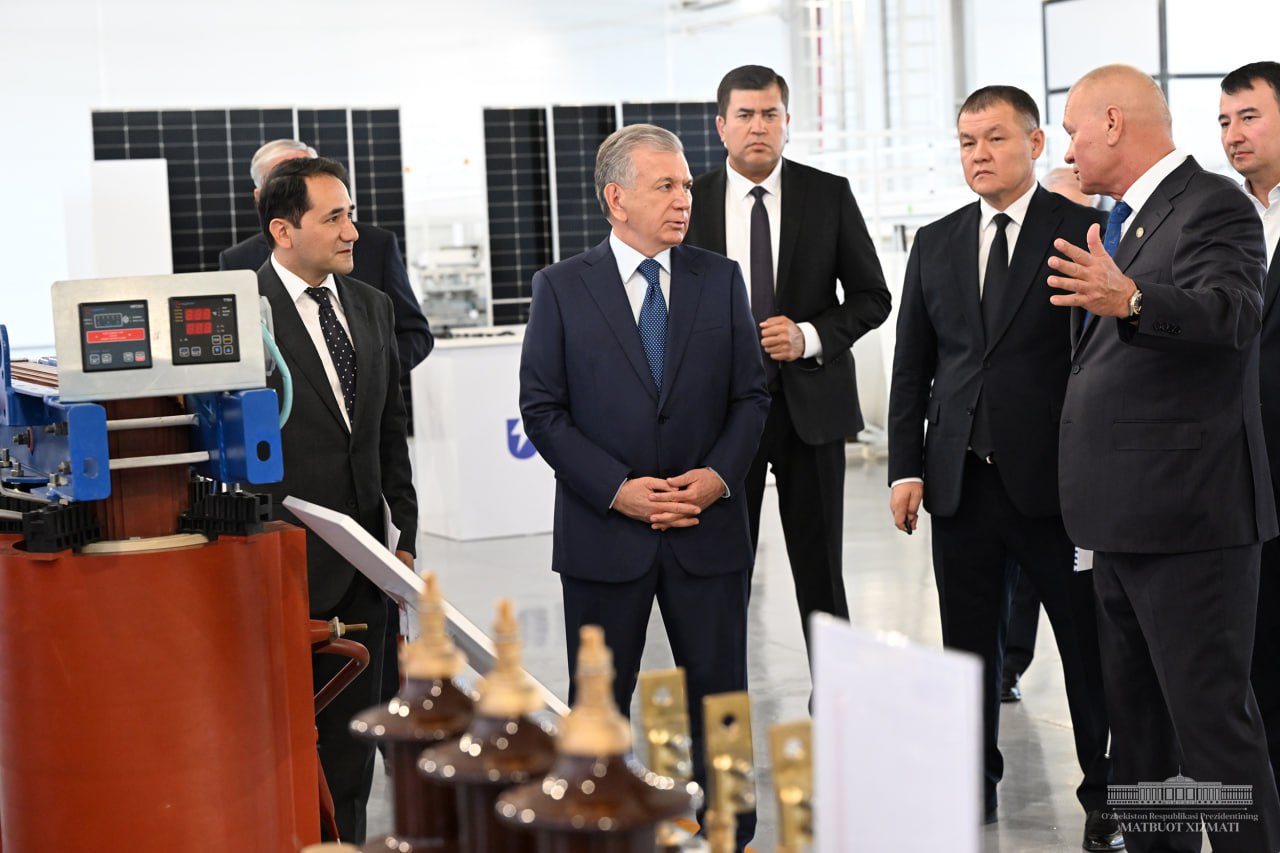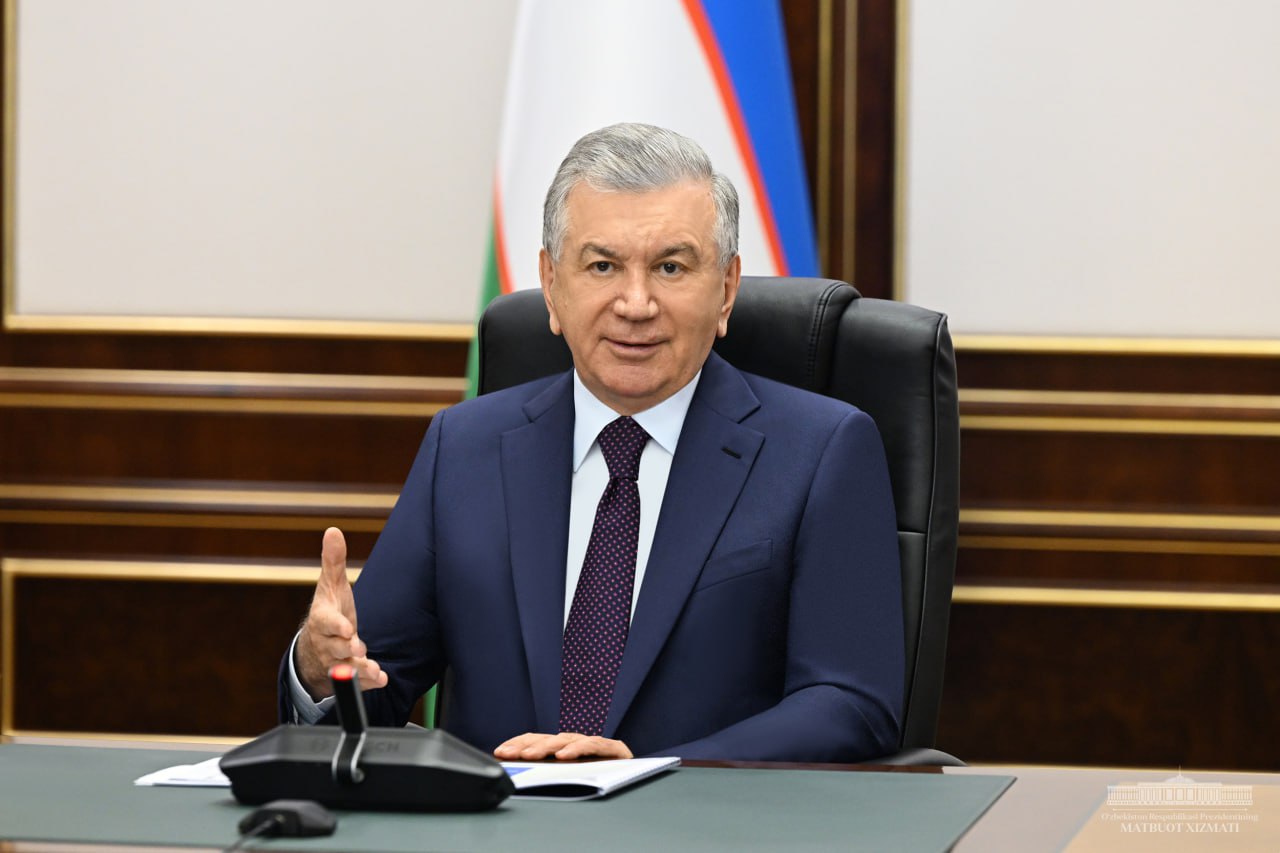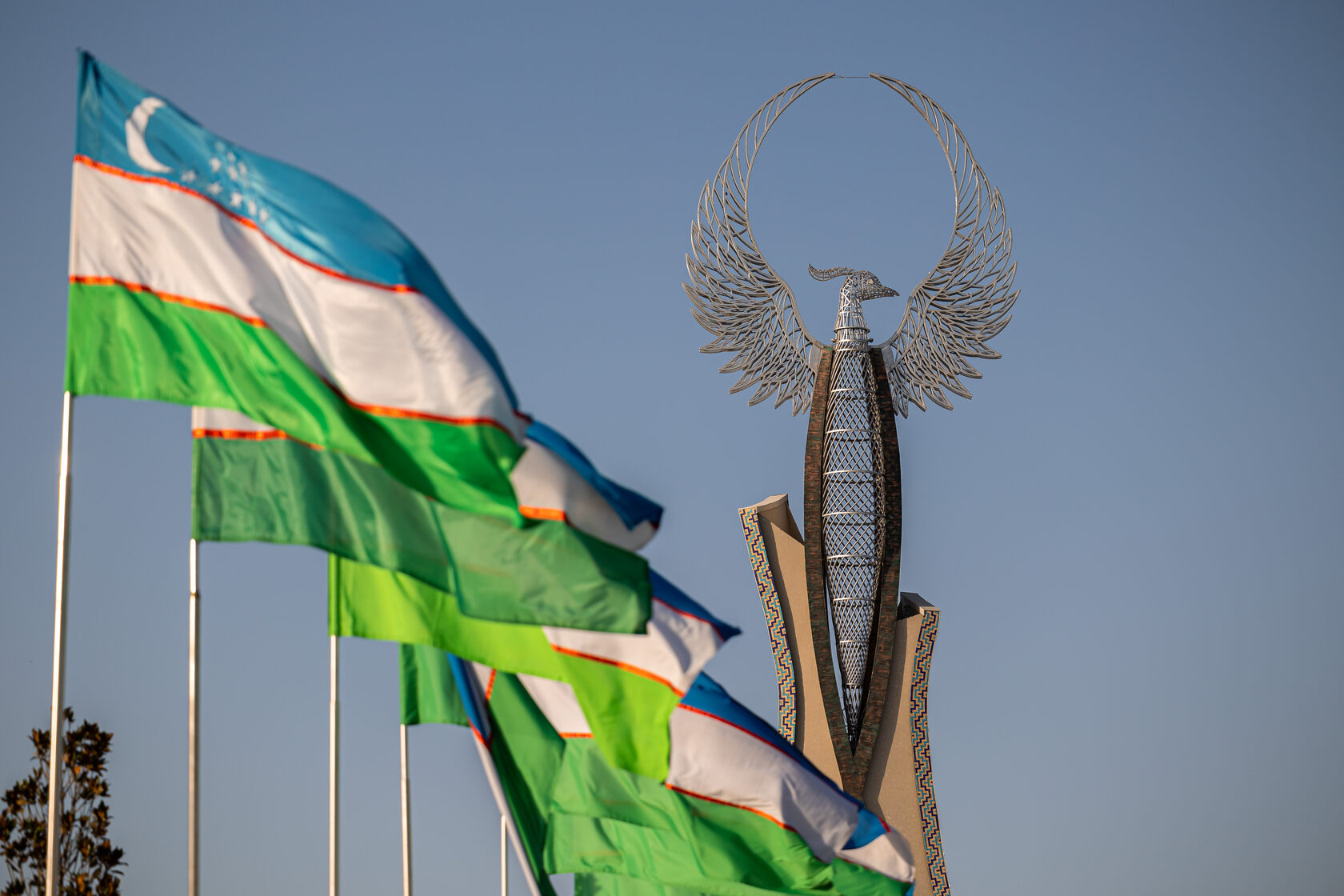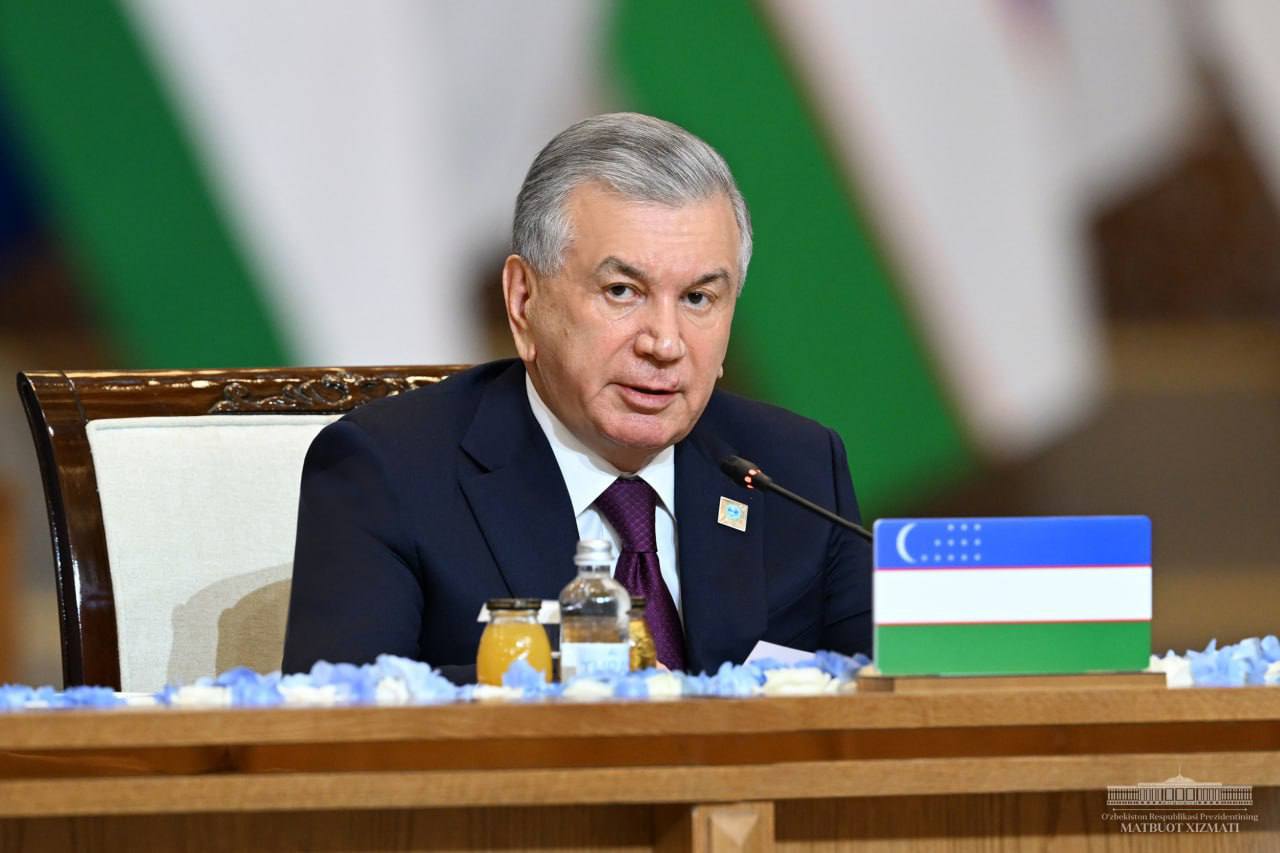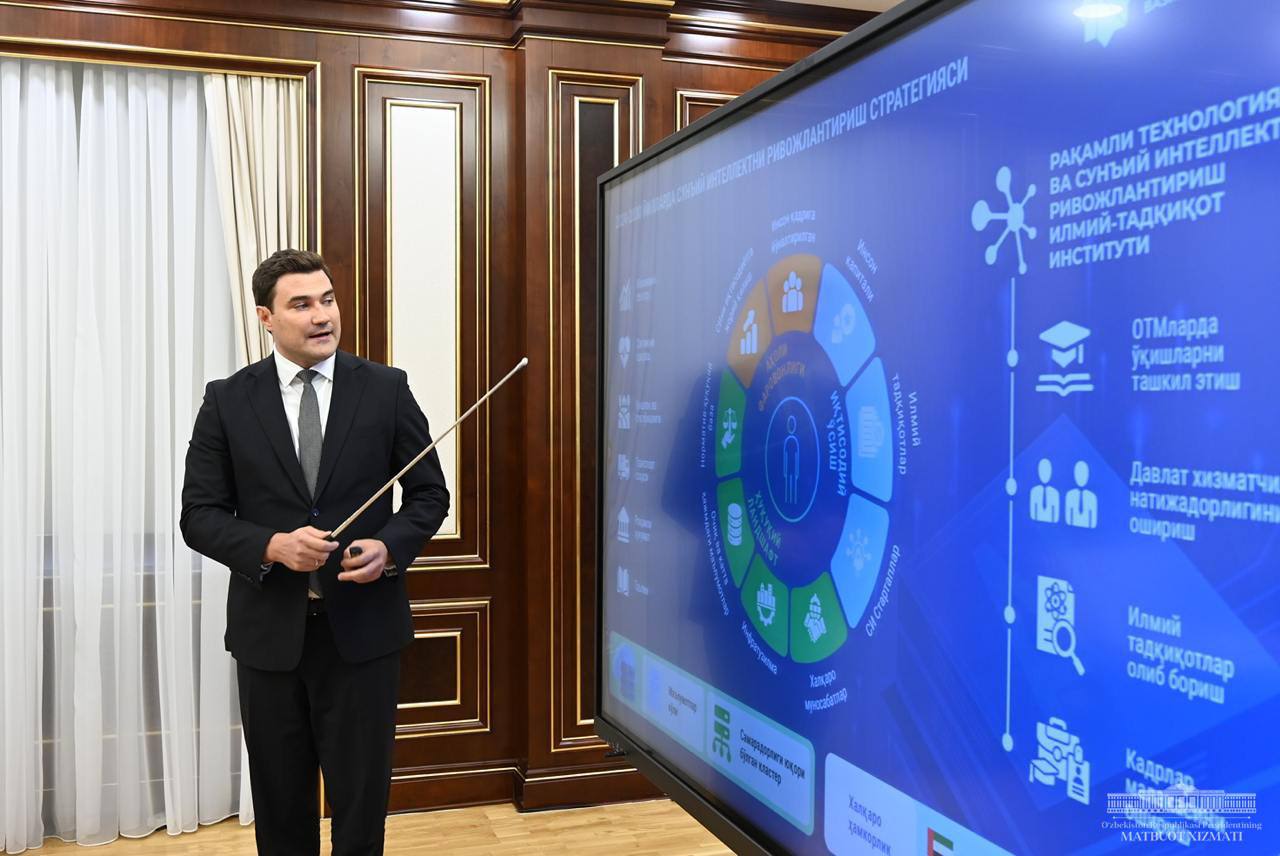Phone
Consular Issues
Phone
Uzbekistan news
We recommend
President Shavkat Mirziyoyev votes in elections
📅 27.10.2024
Today, elections to the Legislative Chamber of Oliy Majlis and kengashes of people's deputies are being held in our country.
President of the Republic of Uzbekistan Shavkat Mirziyoyev together with his family members visited polling station No. 59 in Mirzo-Ulugbek district of the capital and took part in the voting.
Article 128 of the Constitution of our country states that citizens have the right to elect and be elected to the representative bodies of state power. The right to vote, equality and freedom of expression are guaranteed by law.
Five parties are running in the elections: the Movement of Entrepreneurs and Business People - Liberal Democratic Party of Uzbekistan, the Milliy Tiklanish Democratic Party, the Ecological Party, the People's Democratic Party and the Adolat Social Democratic Party.
This important event is taking place in the context of increased social and political activity in our country, under the slogan “My Choice - Prosperous Motherland”.
For the first time in the history of Uzbekistan, elections to the Legislative Chamber of the Oliy Majlis are held on the basis of a majoritarian-proportional, that is, mixed electoral system. 75 deputies are elected directly under the majoritarian system, i.e. by voting for their preferred candidates, and the remaining 75 - under the proportional system, when votes are cast for political parties.
Over the past period, the electoral legislation has been radically improved in line with advanced democratic standards. In particular, a new system of electoral bodies headed by the Central Electoral Commission had been introduced, and, in order to enhance the role of women in society, it had been established that the proportion of women among political party candidates should be at least 40 per cent.
Another notable aspect of the current elections was that the interaction between the participants in the process had been fully digitalized through the E-Saylov information system.
This information system has raised the openness of the elections to a higher level.
All polling stations have created conditions for voters in accordance with the law. There are 5,770 district and 11,028 precinct election commissions organized in the field, including 57 polling stations in 40 foreign countries.
More than 850 foreign and international observers from the CIS, SCO, Organization of Turkic States, as well as a full-scale mission of the OSCE Office for Democratic Institutions and Human Rights are taking part in monitoring the election process.
The head of state talked to citizens who came to the polling station. He thanked them for their active participation in the elections with a sense of involvement in the fate of their native country and their district.
DEVELOPMENT OF TOURISM RELATIONS BETWEEN UZBEKISTAN AND THE CIS COUNTRIES: DYNAMICS AND PROSPECTS
📅 06.11.2025
In recent years, Uzbekistan has demonstrated significant progress in the field of international tourism, which pays special attention to cooperation with the CIS countries. Historically, this region has close cultural, economic and humanitarian ties with Uzbekistan, which contributes to the active exchange of tourists and the development of joint initiatives in the tourism industry. According to statistics for January–August 2024 and 2025, there has been a steady increase in the total number of tourists from 6.7 million visiting Uzbekistan to more than 7.5 million with an annual increase of 15-20% per year. By the end of 2025, more than 11 million foreign tourists are expected to arrive.
Kazakhstan, Kyrgyzstan and Tajikistan remain the most significant sources of tourists among the CIS countries. In 2024, Kazakhstan sent more than 2.1 million tourists to Uzbekistan in January – August, Kyrgyzstan — about 1.78 million, and Tajikistan — almost 1.6 million. In 2025, Kyrgyzstan slightly surpassed Kazakhstan in the number of visitors — 2.16 million against 1.77 million, which indicates a positive trend towards strengthening bilateral ties in the field of tourism. Tajikistan also showed an increase of almost 1.7 million tourists. In addition to the traditional leaders, the number of tourists from Turkmenistan increased significantly in January–August, from 125,000 in 2024 to 243,000 in 2025. This growth confirms the growing attractiveness of Uzbekistan as a tourist destination for all neighboring countries.
The CIS countries with fewer tourists, such as Azerbaijan, Belarus, Moldova, Armenia, Ukraine and Russia, also note positive dynamics. The increase in the number of Russian tourists in January –August is particularly noteworthy — from 587,000 in 2024 to more than 663,000 in 2025, reflecting the strengthening of tourist and cultural ties between the two countries. The growth of the tourist flow from the CIS is largely due to Uzbekistan's comprehensive work to improve infrastructure, simplify visa procedures, and actively promote travel brands. The development of transport links, the introduction of modern services and the expansion of the range of tourism products make Uzbekistan more and more attractive to visitors from neighboring countries.
Uzbekistan is the historical center and pearl of the Great Silk Road, the crossroads of world cultures and civilizations. There are more than 8,000 cultural heritage sites in the country. 209 of them are part of four museum cities included in the UNESCO World Heritage List. The magnificent monuments of the ancient cities of Samarkand, Bukhara, Khiva attract many tourists who want to get acquainted with the rich heritage of the region. Samarkand is the ancient capital of the empire of the great commander Amir Temur, which houses the most beautiful Registan ensemble, the Ulugbek Observatory and the Imam Al-Bukhari complex, the most important for Muslims, the fabulous city of Bukhara, famous throughout the Islamic world with its Bahauddin Naqshbandi complex, the Ark fortress and the Poi Kalyan ensemble, the capital of the Khorezmshah State Khiva with a museum city open-air Ichan-Kala, and of course the city of Shakhrisabz, where Amir Temur was born and built the Ok-Saroy palace there.
Tashkent, the capital of Uzbekistan, is the geographical center and the largest hub of Central Asia, a connecting bridge between East and West. Tourists can get great emotions and impressions from their stay in Tashkent, which has many interesting sights, including the architecture of modernity and the ancient East. Uzbekistan is not only a historical city, but also a huge number of natural attractions: the picturesque mountains of the Western Tien Shan and Pamir Alai, mysterious caves, the endless Kyzylkum desert, a huge number of lakes, the Ustyurt plateau and the Aral Sea in Karakalpakstan. It should be noted that Uzbekistan occupies high places in the world tourism rankings, in the field of security, historical attractions, family tourism, gastronomy, etc. There is a tourist police in all tourist centers of the country, thanks to which all foreign visitors feel safe at all times. At the same time, over the past 10 years, Uzbekistan has not had any incidents related to the safety of tourists in the country, which could negatively affect the tourist image of Uzbekistan. Great attention is paid to youth tourism in the country, special tours of historical subjects, ecotourism, extreme tourism, and industrial tourism have been formed to visit various production facilities, which also serve as their subsequent professional orientation.
The Government of Uzbekistan has identified several territories with high tourism potential as free tourist zones created specifically for businesses operating in the tourism sector. Conditions have been created to attract foreign investment in the tourism sector. To encourage investors, various incentives have been introduced for the hotel sector, the construction of tourist complexes and infrastructure. Business representatives from the CIS countries are the most active investors, creating both enterprises with 100 foreign investments and joint ventures in the tourism industry of Uzbekistan. Uzbekistan invites Russian investors to take an active part in joint projects in the territories of Charvak, Chimgan, Nanai, Baysun, Maidanak, Miraki, Parkent, Akhangaran, Angren, Akchakul, Tudakul, Aydarkul and others tourist zones. The development of tourism with the CIS countries is becoming not only a factor of economic growth, but also an important element in strengthening interstate relations, cultural exchange and friendship of peoples. The growth of the tourist flow contributes to the creation of new jobs, the development of small and medium-sized businesses and the improvement of the standard of living of the population. The prospects for further development of tourism ties between Uzbekistan and the CIS countries look very promising. Enhanced cooperation, exchange of experience and implementation of innovative solutions will make the region one of the most attractive and dynamically developing tourist destinations in Eurasia. The Committee on Tourism of Uzbekistan is ready to support the tourism business of our countries in the implementation of joint projects, and create all necessary conditions for comfortable travel of tourists of all categories from the CIS countries.
Head of the Department of
Transport and Logistics Development Shukhrat Isakulov
Transforming the Aral Sea region into a global hub for climate technologies: green energy, water-saving innovations, and opportunities for international partnership
📅 08.10.2025
Introduction: The Significance of President Shavkat Mirziyoyev’s participation in the 80th session of the United Nations General Assembly
The participation of the President of the Republic of Uzbekistan in the 80th session of the United Nations General Assembly (UNGA) this September held profound political and historic significance not only for our country but for the entire region. Speaking from this prestigious platform, which gathers heads of state from across the globe, Uzbekistan raised critical issues including sustainable development, combating climate change, ensuring food security, and the efficient management of water resources.
Through his address at the United Nations, a premier global institution, our President further solidified Uzbekistan’s international standing and reputation as a proactive and responsible state. Notably, by showcasing the ecological and innovative initiatives being implemented in the Aral Sea region, Uzbekistan demonstrated its openness to global cooperation in addressing pressing environmental challenges.
Another significant aspect of this participation is the integration of Uzbekistan’s international environmental initiatives into the global political agenda, highlighting the Aral Sea region as an open platform for advancing climate technologies.
During the visit, the initiatives concerning the Aral Sea region received significant attention from the international community.
During his address at the 80th session of the United Nations General Assembly, our President paid special attention to the environmental disaster in the Aral Sea region and the ongoing initiatives aimed at mitigating its consequences. This issue has garnered significant focus from the international community, reaffirming that the Aral Sea crisis is recognized not only as a regional challenge but also as a global environmental concern.
Uzbekistan’s initiative to transform the Aral Sea region into a hub of sustainable development and innovation has received strong support from international partners. In particular, significant opportunities were highlighted for implementing joint projects in areas such as green energy, water-saving technologies, ecotourism, and the restoration of biodiversity.
Thus, the raising of the Aral Sea issue on the prestigious platform of the United Nations during the visit served as a significant political and practical foundation for strengthening global cooperation and attracting increased attention from international donors and organizations.
Transforming the Aral Sea region into a hub for global climate technologies.
The challenges arising from the desiccation of the Aral Sea serve as a profound lesson for the entire world. In response, Uzbekistan aims to transform the Aral Sea region into a “global laboratory” by implementing advanced practices in green energy, water-saving technologies, biodiversity restoration, and climate change adaptation.
Such an approach not only addresses regional challenges but also offers an effective model for the international community. The projects being implemented in the Aral Sea region can subsequently serve as a replicable framework for other areas facing the impacts of climate change.
On May 18, 2021, during the 75th Session of the United Nations General Assembly, our President put forward the initiative to designate the Aral Sea region as a hub for ecological innovations and technologies. This proposal received enthusiastic support from the United Nations and the international community, and was unanimously adopted by all member states during the General Assembly plenary session. This resolution underscores Uzbekistan’s consistent and steadfast commitment to addressing the Aral Sea crisis and mitigating associated risks through a principled and effective approach.
The Aral disaster and its lessons for humanity.
The Aral Sea disaster is recognized worldwide as one of the greatest environmental catastrophes in human history. Once the fourth-largest lake in the world by surface area, the Aral Sea has almost completely dried up over the past half-century. This tragic development has dealt a severe blow to the regional climate, biodiversity, public health, and economy.
The drying up of the Aral Sea stands as a vivid example of human intervention that was not in harmony with nature. Excessive and inefficient use of water in irrigation, coupled with ineffective irrigation systems and planning errors, led to this major environmental disaster.
This tragedy underscored the necessity for humanity to use natural resources efficiently and wisely, highlighting the importance of developing water supply and agriculture solely based on sustainable technologies. At the same time, it clearly demonstrated that ensuring environmental security requires global solidarity and close international cooperation.
The imperative of sustainable development in the region.
The Aral Sea region today represents one of the most critical challenges for environmental, social, and economic sustainability in Uzbekistan and the broader Central Asian region. The limitations of natural resources, issues related to water supply, ongoing desertification processes, and declining living standards underscore the urgent need to implement a comprehensive sustainable development strategy in this area.
The necessity for sustainable development in the Aral Sea region is grounded in several key factors. Primarily, environmental security remains a pressing concern: frequent dust storms, soil degradation, and the loss of biodiversity pose direct threats to public health and the quality of life. Additionally, economic considerations are paramount, as the modernization of agriculture — the main source of income for the local population — requires the adoption of water-saving and innovative technologies.
Ensuring social sustainability requires a comprehensive set of measures aimed at creating new employment opportunities, increasing household incomes, and mitigating the risks of environmental migration. Furthermore, given that the challenges in the Aral Sea region transcend regional boundaries and hold global significance, addressing them necessitates reliance on international cooperation and partnership.
Opportunities of the Aral Sea region as an international innovation hub and platform for cooperation.
It is widely recognized that Uzbekistan has undertaken extensive and positive national efforts to combat the adverse environmental and public health impacts caused by the drying up of the Aral Sea. Since the early years of independence, the population of the White Aral Sea region has consistently felt the substantial support of the Uzbek government. The Government of Uzbekistan remains committed to paying continuous attention to the social welfare of the communities residing in the Aral Sea area.
Today, the Aral Sea region serves as an international innovation hub, playing a crucial role in promoting sustainable development in an area severely affected by ecological crisis. Through scientific, innovative, and practical projects, the center actively advances comprehensive work in key sectors including environmental protection, water resource management, agricultural technologies, energy, climate adaptation, and international cooperation.
In order to enhance the activities of the Center and further develop ecological and innovative technologies in the Aral Sea region, the Aral Sea International Innovation Center was transferred under the jurisdiction of the Ministry of Ecology, Environmental Protection, and Climate Change of the Republic of Uzbekistan, in accordance with Presidential Decree No. PQ-171 dated May 31, 2023.
In accordance with Presidential Decree No. PQ-5202 dated July 29, 2021, a modern laboratory, business accelerator training center, and technopark building, valued at 12.4 billion Uzbek soms, were completed and commissioned in 2024 within the Center’s premises. The laboratory is equipped with a plant seed gene bank and serves as a crucial scientific and innovative platform for preserving biodiversity in the region, protecting both native and introduced species, and achieving high efficiency in agricultural practices.
Currently, efforts are underway to commence full-scale operations at the facility, enrich the gene bank with an extensive seed collection, organize scientific research, and enhance the expertise of local specialists. This initiative not only supports sustainable agricultural development in Uzbekistan but also plays a crucial role in ensuring food security amid climate change and advancing international scientific cooperation across the entire Central Asian region.
Over the past period, the Center has established effective cooperation with a range of international and local organizations, as well as research institutes, in conducting scientific research and implementing projects. In particular, agreements and memoranda of understanding have been signed with over 70 foreign and domestic entities. Currently, 20 scientific-practical and innovative projects with a total value of 23.9 billion Uzbek soms are being carried out. These projects encompass alternative green energy, aquaculture, intensive horticulture, medicinal plant cultivation, resource-saving technologies, and social programs.
The Center’s activities are primarily focused on improving the living standards of the population, introducing and developing salt- and drought-tolerant crops, and implementing resource-efficient technologies. At the same time, it carries out scientific-practical and innovative initiatives aimed at restoring ecosystems, preserving biodiversity, and enhancing the quality of life in collaboration with leading international organizations. Among these partners are the United Nations Development Programme (UNDP), the International Center for Biosaline Agriculture (ICBA, UAE), the Xinjiang Institute of Ecology and Geography (China), the Deutsche Gesellschaft für Internationale Zusammenarbeit (GIZ), the Global Green Growth Institute (GGGI), the Korea International Cooperation Agency (KOICA), the Japan International Cooperation Agency (JICA), and other prestigious institutions.
The “Samanbay” (24.3 hectares) scientific-production site in Nukus district and the “Moynoq” (106 hectares) site in Moynoq district serve as the primary experimental and testing bases of the Center. At these sites, experimental research and monitoring activities are being conducted in cooperation with foreign and local organizations. Additionally, the Center hosts joint laboratories established in partnership with international collaborators, as well as its own in vitro, soil, water, and plant biotechnology laboratories. These infrastructures support the deepening of scientific research carried out in the experimental fields and enhance the effectiveness of ongoing studies.
Each of the ongoing projects is aimed at creating long-term solutions for the Aral Sea region. Thanks to its innovative approach and international cooperation, the Aral Sea International Innovation Center is gradually becoming the primary platform in Central Asia for scientific research, technological development, and sustainable development.
In its future plans, the Aral Sea International Innovation Center aims to ensure environmental sustainability by implementing innovative eco-technologies, including desertification control measures and smart agriculture solutions.
Simultaneously, to strengthen scientific research activities, plans have been made to establish modern laboratories, a business accelerator, a training center, a technopark, experimental sites, and data analysis centers.
The Center aims to implement large-scale joint projects by further expanding cooperation with international organizations. Additionally, one of the Center’s priority directions is developing programs focused on fostering innovative ideas, creating startups, and enhancing professional skills for farmers, entrepreneurs, local communities, youth, and women.
Conclusion
The Strategic significance of the initiative to transform the Aral Sea region into a global hub for climate technologies.
The initiative to transform the Aral Sea region into a global hub for climate technologies holds strategic significance not only on a regional scale but also worldwide. Its core essence lies in ensuring environmental sustainability, conserving water resources, mitigating desertification processes, and restoring biodiversity.
At the same time, the introduction of solar and wind energy, modern irrigation systems, and innovative technologies will open broad avenues for the development of a green economy in the region. This initiative will strengthen cooperation with international organizations such as the United Nations and the Green Climate Fund, creating new employment opportunities for the local population and enhancing overall prosperity.
Most importantly, the Aral Sea region’s experience will serve as an effective model in addressing climate change and water resource challenges on a global scale in the future.
Director of the Aral Sea International Innovation Centre under the Ministry of Ecology, Environmental Protection and Climate Change of the Republic of Uzbekistan
B.S.Khabibullaev
The President familiarized himself with the new project of the joint venture
📅 19.08.2024
Президент Шавкат Мирзиёев начал свою поездку в Республику Каракалпакстан с ознакомления с промышленным потенциалом региона.
Совместное предприятие “Nukus Eleсtroapparat” было введено в строй в 2017 году, оно производит силовое оборудование для электросетей. В июне текущего года здесь был запущен проект по изготовлению солнечных панелей стоимостью более 10 миллионов долларов. Оборудование было доставлено и установлено из Республики Корея. Производственный процесс полностью автоматизирован. Годовая мощность проекта составляет 273 тысячи единиц.
Это будет способствовать дальнейшему внедрению альтернативной энергетики в нашей стране. На сегодняшний день в различных сооружениях и домах установлены солнечные панели общей мощностью 600 мегаватт. Этот процесс продолжается.
Наряду с локализацией востребованной на внутреннем рынке продукции совместное предприятие получило возможность экспортировать продукцию на 4 миллиона долларов. Обеспечено работой 70 человек.
Глава нашего государства ознакомился с технологическим процессом, побеседовал с работниками. Ответственным лицам даны указания по увеличению количества таких предприятий и производству ими продукции с высоким спросом на рынке.
Здесь же была представлена продукция, производимая предприятиями отрасли.
На самом заводе установлены солнечные панели мощностью 125 киловатт. Полученная электроэнергия используется для внутренних нужд, а излишки реализуются в региональную электросеть.
За последние годы в нашей стране за счет инвестиций в размере 2 миллиардов долларов введены в эксплуатацию 10 солнечных и ветряных станций общей мощностью 2,6 гигаватта. Также ведется работа по 32 "зеленым" проектам мощностью 18,6 гигаватта общей стоимостью 19 миллиардов долларов. В целом к 2030 году намечено довести долю возобновляемых источников энергии в энергетическом балансе до 40 процентов.
Proposals on further development and increase of competitiveness of the jewelry industry were considered
📅 19.06.2024
President Shavkat Mirziyoyev was given a presentation on measures to further develop the jewelry industry, support jewelry production and sales, and increase exports of finished products.
Our country has a huge potential for increasing production and export of jewelry.
As the head of state noted, only 6 percent of gold mined in the country is processed, and exports of its products amount to only 78 million dollars, so it is important to create jewelry zones with special conditions for entrepreneurs, to review the provision of raw materials, training of specialists, production chain and sales system.
In this regard, the Ministry of Economy and Finance and the Chamber of Commerce and Industry have developed relevant proposals.
In particular, it is planned to improve the activity of the Uzbekzargarsanoati association, expand its powers and reorganize the management system.
In order to support manufacturers of the industry, it is proposed to apply the benefits provided for members of the Association "Uzbekzargarsanoati" to individual entrepreneurs - manufacturers of jewelry, who are members of the Association "Uzbekzargarsanoati".
The possibility of establishing a zero rate of customs duty and value added tax on equipment, packaging and marking materials that are not produced in Uzbekistan and used in the jewelry industry for the period up to October 1, 2026 is being studied.
The issues of creation of special jewelry centers including production, exhibition and trade areas were considered. Information was provided on the placement of pilot projects in Tashkent and Namangan region.
The issue of increasing the volume of jewelry exports was discussed. It was proposed to establish a zero rate of customs duty for export of jewelry made in our country to the United States of America under the GSP system.
The head of state instructed to finalize the presented measures and work out a program for the development of domestic jewelry production for the period up to 2027.
Founder of BMB HOLDING: Supporting entrepreneurs in the process of building New Uzbekistan has become one of the main goals of the reforms of our Head of state
📅 21.08.2024
In recent years, systematic work has been carried out to create a continuous chain of comprehensive support for the development of entrepreneurship in our country. As a result of the measures implemented and important decisions made over the last seven years, a new generation of entrepreneurs of New Uzbekistan has emerged.
In particular, BMB HOLDING is one of the major subjects of private entrepreneurship, playing an important role in the economic life of our country, and gaining strong positions not only in the domestic, but also in the international market.
On the eve of the 33rd anniversary of independence of the Republic of Uzbekistan, Dunyo information agency talked to Bekzod Mamatkulov, the founder of BMB HOLDING.
– Mr. Mamatkulov, in recent years BMB HOLDING has gained a great reputation not only in Uzbekistan, but also among the international business community. Today, the Holding effectively works in the areas of providing consulting services on investment projects, developing international business and trade relations, attracting foreign investments, export-import exchange, introducing innovative technologies, creating modern agro-industrial clusters. We would like to start our conversation with the organization of the Holding and the history of its development.
– After his election as President, Shavkat Mirziyoyev put on the agenda of our state’s policy such important issues as increasing economic potential, attracting investments and, most importantly, supporting entrepreneurs to bring the country to a new stage of development.
In this sense, the opportunities created for entrepreneurs have radically changed my life goals and made me want to test my potential in business.
We generated our first income through services. Developing business plans and providing consulting services was our first source of income. Later we bought land in Arnasay district of Jizzak region to implement our agricultural projects. We planted mung beans and peas as secondary crops here. The first attempts were successful. The agricultural products we grew gave better results than we expected. For the first time we were able to export our crops abroad. In particular, we started selling agricultural products to Pakistan, India and Afghanistan. Later, we had a plan to supply cotton and grain to the state on a contract basis, and we gradually expanded our financial capacity, making a profit from it.
In 2017, during the visit of the Head of state to Jizzakh region, our project to create a food cluster in Arnasay district was presented. At the meeting, the President emphasized that he would support us, like all businessmen, and expressed great confidence in us. Such attention and support of the President of the country gave us additional strength. After that, there was a desire to further expand our business activities, to test ourselves in new industries, to develop and implement joint projects with foreign partners.
In particular, in 2018, we were among the first to create the largest cotton cluster in the country. Thanks to the attention of the management and creation of favorable conditions for doing business, we created a cluster for growing medicinal plants, namely saffron. Later we organized a fruit and vegetable cluster. This big project, in turn, enabled us to set up a system of sorting, packing and deep processing of fruits and vegetables. Thus, having passed through various stages of business, our small project has now formed into BMB HOLDING. At present the Holding unites 30 enterprises. They employ more than six thousand people across the country.
– It is no secret that today the Holding realizes investment projects of international and national level. As an entrepreneur and a person who knows the business environment in foreign countries, how do you assess the investment environment in Uzbekistan? Are there aspects that do not satisfy you, are there factors that are obstacles for business?
– In the process of building New Uzbekistan, the creation of a favorable investment environment for entrepreneurs has become one of the main goals of the reforms of the Head of our state. The adoption by the President of Uzbekistan of a number of decrees and resolutions aimed at supporting entrepreneurs is yielding results today.
Improvement of tax legislation, creation of the possibility of free currency conversion, reforms in the sphere of private property and a number of other positive changes related to these spheres have played their important role, and entrepreneurs are now considered as the driving force of the country’s economy. In 2020-2022, despite the fact that the coronavirus pandemic worldwide had a large negative impact on the economies and the global investment environment, Uzbekistan’s economic growth rates remained stable and its investment attractiveness continued to grow.
The fact that the inflow of foreign investments into the country has increased significantly testifies to the confidence of international business in the economic reforms in our country. Active diversification of the economy is an important achievement that has opened new opportunities for investors in all sectors, starting with industry.
Now, if we talk about the factors that are obstacles for business, aspects that do not satisfy entrepreneurs, I will tell the truth openly: at the level of the government, reforms are being implemented very intensively, positive changes are taking place. But when you go to the lower level of the system, there are still cases of inattention and carelessness somewhere. I believe that such shortcomings will be eliminated.
– We know that BMB HOLDING is engaged in the production and export of a wide variety of agricultural products. In particular, the organization headed by you has achieved great success in saffron cultivation. Today saffron grown in Uzbekistan is becoming popular in many regions of the world. Tell me, when did you come up with the idea of establishing such a complex sphere as saffron cultivation in Uzbekistan and why did you choose this particular project?
– During President Shavkat Mirziyoyev’s visits to Kashkadarya region in 2017, the issue of cultivation of medicinal plants in mountainous and foothill regions, development of this sphere in our country and export of valuable medicinal plants to the world market was prioritized. The leader of our country also inquired why it is impossible to grow saffron in Uzbekistan despite all conditions, and gave a special instruction to develop this industry. During the President’s visit to Jizzakh region, we made a detailed presentation of our saffron cultivation project. Having familiarized himself with the project, the Head of state expressed his full support to it and instructed the responsible persons to implement the program as soon as possible.
However, it was not easy to realize this project at first. When implementing this business idea, first of all, we deeply studied the demand and supply in the domestic and foreign markets, opportunities and prospects for its implementation in the conditions of Uzbekistan, our own potential in this area, as well as a number of other factors. In 2020, we started to implement the project in pandemic conditions. At first, it took a lot of patience and hard work to find specialists, to bring saffron bulbs suitable for our climate from Europe and to get the desired harvest. In the first year we planted saffron bulbs on 55 hectares of land. The high demand for the harvest and the experience gained stimulated further development and expansion of the project. Today saffron is grown on 400 hectares of land. In the next three years, it is planned to increase the area of saffron plantations to 1,000 hectares and produce 20 tons of pure saffron products per year.
At the beginning of 2024, the product BMB Za’faron for the first time in our region received the USDA Organic certificate, an environmental certificate developed by the U.S. Department of Agriculture, which allowed Uzbek saffron to enter the American markets. After several years of in-depth analytical research, Uzbek saffron grown in the Bakhmal district received the appropriate permission to export to Chinese markets according to the conclusion of the Uzbek-Chinese interdepartmental commission.
– Indeed, a lot of experience in saffron cultivation has been accumulated in recent years. At the same time, what countries’ experience do you think should be studied and implemented in order to grow a competitive product that meets the requirements of international standards and markets?
– In agriculture, each product is grown using a specific method. Such countries as Italy, Austria, South Korea, USA, and Saudi Arabia have enough experience in saffron cultivation. Of course, we study the experience of countries with climatic conditions close to ours and exchange experience with industry experts. I can say that we have mobilized all possibilities to get more crops and export them abroad. The increase in exports, in turn, contributes to increasing the inflow of foreign currency into Uzbekistan and ensuring economic stability.
To bring our national products to the world market and increase their competitiveness, the most important factors are, first of all, quality, then price and, of course, matching production capacity to demand. We have taken these aspects into account in our work and projects, especially in saffron cultivation.
– In Uzbekistan, on the initiative of the Head of our state, an open dialog with entrepreneurs is held annually. Tell me, what impact do these efforts have on the activities of the Holding headed by you?
– It would not be an exaggeration to say that the adoption of a number of resolutions and decrees on creation of favorable business environment and healthy competition in our country, comprehensive support for entrepreneurs, further liberalization of tax policy have served to eliminate the problems that have arisen for many years and hindered the free activity of entrepreneurs.
Thanks to the political will of the President of Uzbekistan, the organizational and legal foundations for the development of the industry have been strengthened, and the attention to entrepreneurs has changed dramatically. Most importantly, all this has already started to yield positive results.
In addition, an open dialog between the President of the Republic of Uzbekistan and entrepreneurs has been established. In my opinion, there is no other country in the world that has such a format.
I can confidently say that the open communication of the Head of state with the business community, which has now become a tradition and is held annually, serves as an important factor in the formation of a new competitive class of entrepreneurs in New Uzbekistan.
I visit many countries for work. In particular, my friends-partners in Italy, Germany, the United States, Austria and other countries highly appreciate the annual dialog of the President of Uzbekistan with entrepreneurs. It is no secret that people look at us with envy when they see the personal attention of the Head of state to the development of business in our country. In fact, it is a great achievement for both sides — the President meets with businessmen, listens to their systemic problems, finds solutions and solves them. Therefore, today all businessmen are looking forward to meeting with the President. This meeting has also become an important forum for businessmen to assess their activities for the year and determine plans for the future. The speeches of our country’s leader at the meeting and important initiatives aimed at further development of the industry, removal of existing obstacles, provision of benefits to entrepreneurs serve as a program for further expansion of businessmen’s activities.
I would like to give an example based on my experience. Before dialoguing with the President, I note in my notebook the issues we face in our work. Listening to the President, I always get comprehensive answers to all my questions based on deep analysis.
– In August 2022, by the decree of the President of Uzbekistan, you were awarded the “Faol Tadbirkor” sign, and in 2023 — the “Dustlik” order. Recall those moments when your entrepreneurial activity was highly appreciated by the leadership of our country.
– Before answering, I have to say one thing. Before coming to business, I worked in state and public organizations for more than 15 years. I never received even a certificate of honor, let alone a state award. Today, the leader’s focus is on people who have sincerely worked for the development of our dear country — Uzbekistan. In recognition of our work, in 2022, I was awarded the “Faol Tadbirkor” sign. In 2023, I had the honor to receive the “Dustlik” Order from the esteemed President. These are not just awards given to me, they are recognition of the work of thousands of dedicated people working in the Holding’s system. Such a high appreciation gives our team more confidence and motivation, and gives us great strength to realize the goals we have set for ourselves.
– The direction of economic diplomacy is becoming increasingly important in attracting foreign investment to Uzbekistan, finding new partners and exporting national products abroad. In this regard, does the Holding, which you head, use the opportunities of diplomatic missions of our country in foreign countries? How satisfied are you with the work of our country's embassies in this direction?
– Frankly speaking, it used to be impossible to meet with diplomats. If you went abroad and wanted to meet with the Ambassador of our country, he would not accept businessmen. This is an open statement. The Ambassador only dealt with politics. Thanks very much to our President, he brought the diplomats’ attention to the economy as well. This, of course, has opened wonderful conditions and opportunities for entrepreneurs. Openness in this sphere, in turn, has become an important step for entrepreneurs in finding foreign partners and attracting investment.
Today, the diplomatic missions of Uzbekistan in foreign countries play a very important role in the activities of the Holding Company, and we feel their support at every stage of realization of our numerous projects. The introduction of the position of Advisor to the Ambassadors of Uzbekistan on economic issues has been very useful for us entrepreneurs. It should be noted that BMB HOLDING has established close relations of economic cooperation with embassies of foreign countries in Uzbekistan, in particular with diplomatic missions of Russia, China, USA and a number of European countries such as Poland, Austria and Latvia.
In a word, the role of diplomatic missions of Uzbekistan and foreign countries in our country is very important in effective realization of the company’s projects.
– Today BMB HOLDING operates in the field of cultivation and production of agricultural products. Our readers are also interested in the future plans of the Holding.
– Our plans for the near future are huge. In particular, the work on establishment of deep processing of agricultural and fruit and vegetable products, and the launching of textile factories in Syrdarya region is in full swing. We also want to implement projects in the field of medicine. Our first project in this direction will be the creation of a health center in Navoi region in 2025. Also, a chain of restaurants and hotels “Zafaron” will be launched in Tashkent city and Tashkent region.
Along with this, we plan to implement the project “Energy-efficient technologies and equipment for production, mining and processing of natural decorative stone” worth 50 million US dollars together with the organization Toksel Makina from Turkey.
– Our last question may be off-topic, but many people are also very interested in this area. We would like to ask about your projects in sports, especially in soccer. What are your goals in soccer and futsal? Also, please, provide information about BMB HOLDING brand ambassadors in the sphere of chess.
– This is an interesting question. BMB HOLDING considers the development of sports in our country, especially soccer and futsal, as one of the main directions of its activity. The Holding was one of the sponsors of Sogdiana soccer club in 2021 and Lokomotiv soccer club in 2022. Since 2023, our Holding has been one of the sponsors of the professional soccer league of Uzbekistan.
At the same time, the BMB PROFESSIONAL FUTSAL CLUB team started its activity in the system of the Holding. A number of famous local and Brazilian futsal players were invited to the team. For the last two years the team won the Cup of Uzbekistan and the Super Cup of Uzbekistan. Today the basis of our team is made up of futsal players playing in the national team of Uzbekistan on mini-football.
On June 30, on the occasion of Youth Day in Uzbekistan together with the Agency for Youth Affairs within the framework of the project of the brand ORRO ROSSO in Milan (this brand is currently the official partner of the Italian soccer club Milan and Monza) we organized a trip to our country of four famous former players of the soccer club Milan, world and European champions Dida, Sergino, Panucci and Zaccardo. I believe that the visit of famous soccer players to Uzbekistan has served to increase the interest and activity of our youth in sports.
As you know, the Futsal World Cup will be held in our country from September 14 to October 6 this year. BMB HOLDING as the main partner organization is preparing for this futsal holiday.
Besides, BMB HOLDING actively supports talented young chess players. Recognizing them as the face and ambassadors of the Holding, we call them brand ambassadors. In particular, FIDE Master of Sports Humoyun Bekmurodov won a silver medal at the X Chessable Sunway Sitges International Chess Festival 2023 held in Barcelona (Spain), and also won the Dubai Police Global Chess Challenge tournament held in Dubai (United Arab Emirates) on May 3-13 this year.
Another of our young chess players is Umida Omonova, a student of the International Chess School, world champion in blitz and rapid, FIDE Master of Sport, member of the Uzbekistan national team, holder of the state award named after Zulfiya, brand ambassador of BMB HOLDING. She also won the 18th round of the Uzbekistan Championship held in April this year.
Another thing is that BMB HOLDING mobilizes all its capabilities and potential in the direction of further prosperity of New Uzbekistan, which is being built under the leadership of the Head of state, improvement of welfare of our people and development of the Motherland.
- Thank you for taking the time to talk to us.
- Thank you.
Dunyo IA
Surkhandarya the cradle of ancient civilizations
📅 26.06.2025
5 reasons to visit Surkhandarya:
- Explore mountain and ecotourism in the region
- Explore monuments of the distant past
- Learn About Religious Monuments
and cult complex of Sultan Saodat, the Buddhist cult center of Karatepa, the Buddhist temple complex of Fayaztepa, the Jarkurgan minaret, and the Buddhist stupa of Zurmala are the oldest religious monuments of the Surkhandarya region.
- Immerse yourself in the cultural heritage of the region
The folklore festival “Boysun Bahori” (“Boysun Spring”) is held here annually, which reflects the unique rituals, traditions and special culture of the people.
- Taste the national cuisine of the region
Here meat is included in almost all dishes. One of the most delicious dishes of this region is Tandoor Gusht.
Also popular is the dish Chuponcha - shepherd's meat, which is prepared from fresh dairy lamb.
The history of the Surkhandarya region has ancient roots dating back to the beginning of great civilizations. This unique place in Uzbekistan is known for its historical monuments and beautiful nature. The region is located in the foothills of Hissar, Bobotaga, Cohitang, which are famous for their beautiful
landscapes and unique natural formations. The rich reserves of mineral water found in the region are an important source of recreation and have healing properties. A trip to Surkhandarya, will be a fascinating experience, during which you can get acquainted with the unusual landscapes of Uzbekistan, see colorful architecture, and immerse yourself in the unique culture of this region.
Canyon Kyzyl
The Canyon Kyzyl, is located in the Surkhandarya region near the village of Baysun and is translated as “Red Canyon”. The length is 30 kilometers, and the highest point is Mount Buritakht, 1218 meters high. Here, nature has created breathtaking labyrinths, stretching for several tens of kilometers, and every turn of the relief, reveals amazing landscapes. In the spring season, the appearance of the canyon differs from the usual harsh stone appearance, since the surface is completely covered with different vegetation, among which rare medicinal herbs can be found. This place is truly amazing and deserves the status of one of the wonders of Uzbekistan.
Cave Boy-Bulok
In the Chul-Bair Mountain range, located in the Surkhandarya region, there is an amazing cave, called Boy-Bulok. It is considered the deepest in the entire Asian continent and reaches a depth of an impressive 1415 meters. Boy-Bulok is located 60 kilometers from the regional center of Baysun, and is a technically complex facility classified as the fifth complexity category.
In 1985, the first study of this unique place was carried out. Various obstacles were found inside the cave, including vertical bends, narrow vertical shafts up to 180 meters deep, and water-filled passages called half-siphons and siphons. Boy-Bulok has an impressive size that extends both down to a depth of minus 1158 meters, where the impenetrable siphon is located, and up to 359 meters. The very impressive amplitude – is 1517 meters.
Boy-Bulok, located at a depth of 1283 meters, is connected with Vishnevsky Cave. These two caves have a potential connection that is 2033 meters deep and extends for about 30 kilometers. This makes Boy-Bulok the third deepest cave in the world.
Massif Khoja Gur Gur ota
In translation, Khoja Gur Gur ota means “Father of all caves”. At an altitude of 3700 meters above sea level, there is a remote region of harsh and very wild nature. The gigantic, sloping peak of the mountain range ends with an impressive 500-meter-high cliff on one side, and deep canyons with cracks tearing the plateau on the other. Here can be seen fossilized traces of dinosaurs, fragments of basalt and crushed stone of the most bizarre shapes, as well as the burial place of the holy righteous man Khumajoy-ota. The slope of Khoja Gur Gur ota extends vertically and has entrances to many caves, many of which have not yet been explored. In addition, upon reaching the highest point of the massif, you will feel like you are standing on a huge wall separating one world from another.
Machay Cave
Machay Cave is another settlement of primitive people, which is located in the Baysun district of the Surkhandarya region. It is located near Mount Cohitang, on the right bank of the Machay River. The cave is 3.4 to 4 meters high, about 8 meters long and about 10 meters wide. It consists of two cultural layers: the upper layer belongs to the Mesolithic, and the lower layer belongs to the late Mesolithic and early Neolithic. Inside the cave, bones of a man and a woman were discovered that date back to the Mesolithic period. It is of great interest to the scientific community is the availability of material evidence of how people lived in the Stone Age. As a result of research, an abundance of artifacts was discovered in Machay Cave, which indicates the way of life of those times. The finds included 87 different stones, hundreds of weapons made from the bones of 15 different animal species, as well as stone knives, axes, handles, sawtooth weapons, arrowheads, bows and spears. The inhabitants of Machay Cave used these various weapons to skin domestic and wild animals and then use them to make clothing for themselves. These findings are of great value to the scientific community, as they allow us to better understand the lifestyle of people of that time. Surkhandarya – the cradle of ancient civilizations.
Sangardak Waterfall
The Sangardak Waterfall is located among the gorges of the Surkhandarya Mountains, being one of the wonders of the country's natural world. The waterfall is situated in the Sariasi region, 205 kilometers from Termez and 30 kilometers from Denau. Sangardak Waterfall is formed from karst waters flowing inside caves, rather than from a mountain river. As a result, people have created various legends about the waterfall and believe that it has healing properties. Moreover, it is worth noting that even ancient Arabs, Greeks, rulers of Transoxiana, and other peoples came to admire the waterfall.
The Teshik-Tash Cave
The Teshik-Tash Cave is located on the slopes of the Baysuntau mountains. In 1938, during excavations, archaeologists discovered an ancient burial there. Scientists discovered five cultural layers 1.5 meters thick. Clay layers and crushed stones separated the layers. The remains of a Neanderthal child are the most famous finding in the cave, which became famous throughout the world and made the site well-known. Soviet archaeologist A.P. Okladnikov, who discovered these remains, subsequently received the Stalin Prize.
Zarautsay Gorge
The gorge is located in the Kugitang mountains in the Surkhandarya region. These are the southwestern spurs of the Hissar ridge. The discovered cave paintings are rare examples of primitive art. All rock paintings in Zarautsay are written in red ocher, unlike other petroglyphs in Uzbekistan. Impressive hunting scenes with running bulls, goitered gazelles, saigas, arrows, chasing dogs and people with bows and axes, as well as mysterious hooded figures who clearly carry out rituals associated with hunting, can arouse interest and surprise among viewers of this unique ancient art person. Of the 200 images found in 1940, only 40 have now survived in the Zarautsay grottoes.
Dinosaur tracks
Traces of hoofed dinosaurs were discovered in the limestones of the Cretaceous period in the village of Gumatak. The footprints are on a stone slab, which is easily accessible from a car after walking only 300 meters.
Speleologists have also discovered traces of other large dinosaurs in Surkhandarya, but to see them you will need to make a separate trip.
Karyshoto Gorges
In the Surkhandarya region, there is another unusual place, the Karyshoto Gorges. The gorges have karst waterfalls along their walls despite the fact that they are located in hot and dry areas.
As a result, you feel as if you have entered a picturesque oasis. The gorge in several places prevents passage due to the rather high waterfalls. However, when you overcome them, you can see how the gorge continues in two directions.
Canyon Kaptarhona
Several thousand doves have been nesting in this canyon for a long time, which is why this place received the name Kaptarhona, which is translated from Uzbek as “dovecote”.
Once upon a time, the canyon was completely deserted, and its only inhabitants were doves, which were so numerous that one could safely call this place the kingdom of these birds.
Kaptarhona is a winding road along a narrow gorge. Various boulders are scattered along the path. Many attractive and exciting turns hide amazing views.
Khojaikon Salt Cave
In 1989, the Khojaikon Salt Cave was opened, which since then, thanks to the concentration of salt and light negative air ions in the air, has helped people cope with various ailments, such as asthma, respiratory diseases, chronic bronchitis, complications of pneumonia, as well as various skin problems.
The cave is 155 meters long and is a salt monolith inside of which there are treatment room chambers, each of which differs in temperature, humidity, pressure and trace element content. The healing procedure takes only 2-2.5 hours a day.
Meteor Lake Kanbeshbulak
Lake Kanbeshbulak is located in the Khaman tract in the west of Surkhandarya region. The lake is an exceptional natural monument.
According to scientists, this lake was formed as a result of a meteorite fall. In their opinion, it was a meteorite crater that filled with water and became known as Kanbeshbulak. The explosive red sandstones that make up the slopes of the lake indicate the origin of the bowl.
Panjob Gorge
The Panjob Gorge is located in the foothills of the Kugitang Tau ridge in the Surkhandarya region of Uzbekistan, 125 km northwest of Termez. This is a very beautiful gorge in which the small river Gazak, in the Karyshoto mountain range, cuts its way through limestone, gypsum and rock salt, creating a powerful picturesque canyon with vertical cliffs more than 200 meters high.
In some places the width of the gorges can be no more than two meters. In the narrow passages of the gorge, the most beautiful place is a 30-meter section on the right side of the canyon. In this place, water is knocked out of a rock covered with bright green moss, either as a curtain of water or in separate streams, forming a multiple rainbow under the sun's rays.
Surkhan State Reserve
The Surkhan State Nature Reserve is located in the Surkhandarya region of Uzbekistan, just 60 kilometers from the city of Termez. The reserve was created in 1986 by combining the Kugitang and Aral-Paigambar reserves. The purpose of its creation was the preservation and restoration of rare species of plants and animals.
The reserve consists of two separate parts, located in the Sherabad and Termez districts of the Surkhandarya region. The reserve occupies 24,554 hectares and is located in the southwestern spurs of the Hissar ridge at an altitude of up to 3,157 meters above sea level. The Surkhan Reserve currently has more than 130 species of birds, as well as more than 25 species of mammals, 27 species of reptiles, and 2 species of amphibians and fish.
Kampyrtepa Fortress
Kampyrtepa is an ancient archaeological site on the territory of Uzbekistan, which is an ancient port city located on the banks of the Amu Darya River (formerly known as the Oxus). It was founded at the end of the 4th century BC and existed until the beginning of the 1st century AD. The main purpose of this settlement was to serve the crossing of the Burdaguy River, as well as to serve as a hotel and customs office. Kampyrtepa served as a transit point for traders traveling along the Silk Road, where they could rest, reload their goods, pray and continue their journey.
After decades of excavations and studying written sources, it was decided that the site of Kampyrtepa is the mysterious Alexandria Oxiana, a port city that Alexander the Great built on the Amu Darya.
Topalang Reservoir
Uzbekistan is famous for the presence of two significant rivers - the Amudarya and the Syr Darya, which flow through its territory and flow into neighboring countries. The Hissar mountain ranges serve as a source for the Topalang River, which originates on the southern slope. It should be noted that the most abundant right tributary of the Surkhandarya has a length of 117 kilometers. The main source of water replenishment in the Topalang River is seasonal snow and glacial water. It is thanks to this that the river supplies water to the Denaus, Shurchin and Kumkurgan districts of the Surkhandarya region.
Hospital “Khojaipok”
Khojaipok Hospital specializes in the treatment of various diseases, including gynecological problems, cardiovascular disorders, general therapy and neurological disorders. To achieve a positive result, various methods are used, such as hydrotherapy (including mineral baths and circular showers), heat therapy, mud therapy, physiotherapy, electrotherapy and ozone therapy.
Upon completion of the procedures, visitors can visit the natural beauty, swim in the resort's pool, play tennis or engage in other outdoor activities in the sports club.
Sanatorium “Omonkhona”
The Omonkhona Balneological Sanatorium, located in the mountains near the city of Baysun, and the Khojaipok Hospital, located at the foot of Mount Kenagi, are the most famous health complexes in the Surkhandarya region.
The thermal water in the Omonkhona sanatorium has healing properties and is part of the health programs of the sanatorium. Using magnetic therapy, laser therapy, acupuncture, water procedures, massages, liver cirrhosis, hepatitis and other diseases are treated.
Hissar Mountains
The Hissar Mountains are a mountain range that stretches 200 kilometers from east to west across the Hissar region of Tajikistan. It is the western part of the Pamir-Alai system. The highest point in Uzbekistan, Khazret-Sultan, is 4643 meters, located on the border of Uzbekistan and Tajikistan. The ridge is a place of unique geological outcrops in Eurasia. The structure consists of sandstones and crystalline rocks interspersed with granite intrusions. In addition, all ecosystems and climates of the Pamir-Alai are represented here. At the highest places there are glaciers and rocky wastelands. A famous natural attraction of the Hissar Ridge, located in the southern part of the mountains, is the cave of Amir Temur. This natural formation, stretching for 860 meters, is considered the largest underground lake in Uzbekistan. It is important to note that the cave was inhabited back in the Greco-Bactrian period (IV-III centuries BC).
Archaeological Museum of Termez
To celebrate the 2500th anniversary of the city of Termez in 2002, the Termez Archaeological Museum was built and opened. Today it is the only archaeological museum in Central Asia, and many of its unique exhibits date back more than 100 thousand years BC. These include 624 museum relics of global significance, displayed using the latest information and communication technologies.
Karatepa Complex
Located in the northwestern part of old Termez, Karatepa is a place of worship associated with Buddhism. On the three hills of this place there are various temples and monasteries that were built in the 2nd century AD. The architecture of Karatepa is remarkable for its unique combination of caves carved into sandstone and buildings made of pakhsa and adobe.
Zurmala Stupa
Northeast of the ruins of the ancient settlement of Termez is Zurmala, a 12-meter-tall Buddhist stupa. It was built during the Kushan period, around the 1st and 2nd centuries AD, while Buddhism was spreading in Central Asia. The modern city of Termez is located 10 kilometers west of the ancient settlement of Termez. On its outskirts one can see the remains of entire complexes of ancient Buddhist buildings, which in the Middle Ages covered agricultural fields. Over time, the Buddhist stupa turned into a clay mound, which was difficult to recognize as a ritual structure.
Mausoleum of Al-Hakim At-Tirmizi
Al-Hakim At-Tirmizi is a sacred place of worship for Muslims and an architectural monument. The mausoleum is one of the holy places of the Surkhandarya regional center. The architectural monument is located approximately 60 kilometers from the current center, northwest of old Termez. Abu Abdulloh ibn Hassan ibn Bashir Al-Hakim At-Tirmizi is an outstanding Islamic figure, author of various philosophical and religious works and founder of the order of Dervishes. About 80 works were written by the eminent At-Tirmizi who received the name Al-Hakim, which means the wise one, due to his deep knowledge and broad vision.
Mausoleum of Ak-Astana-baba
In the village of Telpek-Chinar, Sariasi district, Surkhandarya region, there is the Mausoleum of Ak-Astana-baba. Scientists believe that the mausoleum was built on the grave of the companion of the Prophet Muhammad (SAW), Saint Abu Hurair. The mausoleum has four rooms called “Chorsi Khona,” in which bricks are laid in batches, and the north-eastern part of the complex can be accessed through the roof. At the entrance to the mausoleum, there are two complex signs, about half a meter in diameter. It is still not possible to correctly interpret the semantics of these signs.
Kirk Kiz Fortress
One of the most interesting ancient places is the Kirk Kiz Fortress. Although the fortress is almost completely destroyed at present, even the ruins allow us to see the former size of the structure and marvel at the skill of the ancient architects. The symmetry of Kirk Kiz makes it unique; each archway and corridor have a counterpart located on the opposite side.
Two passages cross the building crosswise and divide it into four equal parts. There are versions that it was a country aristocratic palace, a women's madrasah, a khanaka, or a caravanserai.
Dzharkurgan Minaret
The minaret is located 5 kilometers from the city of Jarkurgan and 40 kilometers from Termez, near the village of Minor. Thanks to the deciphered inscription on the building, it was established that this architectural monument dates back to the 12th century. The inscription states that construction took place from 1108 to 1109 AD, but some scholars believe the date reads differently and construction was completed in 1110.
This building is unique with its decorative elements. At that time, mosaics were often used to decorate minarets; in the case of this minaret, we see vertical decorative corrugations that were made using a specially baked brick masonry, which was cut in a herringbone pattern from top to bottom.
Dalverzintepe Settlement
Dalverzintepe, the main city of the powerful Kushan Empire, has so far been the subject of careful study by many historians and archaeologists. With its secrets and many valuable objects found, the site attracts attention. The largest treasure in history was found here; about 36 kilograms of gold were discovered in this place in 1972.
Archaeological excavations have revealed a lot of new things about the architecture, culture and fortifications of Northern Bactria. Finds such as sculptures, paintings and figurines show the high level of culture of the people of the Kushan Era. According to many researchers, Dalverzintepe is considered the most ancient Buddhist building.
Ensemble Sultan-Saodat
On the outskirts of the city of Termez in the center of the Surkhandarya region of Uzbekistan there is the architectural ensemble of Sultan-Saodat. The memorial complex consists of tombs of the Termez Seyyids, who were considered direct descendants of the Prophet Muhammad. The complex contains various memorial and religious buildings built from the 11th to the 17th centuries. All buildings have a common architectural concept despite the fact that they were built at different times.
Hanaka Kukildor-ota
Khanaka Kukildor-ota in Termez is a holy monastery that has become one of the most revered among Muslims. Khanaka Kukildor-ota was built in the mid-1100s. It stands out among other monasteries due to its unique architecture, history and significance in the Muslim world.
The building contains numerous tombstones, as well as the burial place of the Muslim Saint Kukildor-ota. This prominent religious figure was known for his great righteousness. The monastery was built in memory of him.
After the restoration of the Khanaka, Kukildor-ota acquired a unique appearance, which is characteristic of all architectural monuments of the Timurid era.
Fayaztepa Complex
Fayaztepa is located at a distance of 4 kilometers from modern Termez, Surkhandarya region. The monastery complex consists of 13 rooms and an inner courtyard with an ivan where a refectory was attached to the monastery on the left side. In some places of the complex there are cooking fires, as well as skulls with inscriptions in Bactrian and other ancient languages. Coins of Heliocles (the Greco-Bactrian king) and Kanishki (the ruler of the Kushan Empire) were also found there. According to archaeological excavations, monks used to live in the monastery, and they also provided housing for pilgrims.
In the IV century, Fayaztepa was captured by the Sassanid army (the dynasty of Persian rulers), due to which the complex stopped functioning. Previously, the complex was called Khaya-Vihara, which translates as "the monastery of horsemen". The current name of the complex was given in honor of the director of the Surkhandarya Museum of Local Lore R.F. Fayazov, who participated in the excavations of the Buddha complex.
Neighborhoods of Derbent
The Derbent mountain village is located on an important trade route along the Sherabad River, connecting the southern regions of modern Uzbekistan, Northern Afghanistan and Tajikistan with the central cities of Samarkand, Bukhara and Tashkent, which were known at the time as Shash. The land around Derbent looks heavily damaged — high rocks either form a majestic gate, or almost merge overhead, reminding us of the bloodshed here while defending the borders of different empires.
Also, travelers can expect places that surprise with their power, strength and pristine beauty. Here you will find gorges including the famous Iron Gate, which was besieged by Alexander the Great.
The Church of Alexander Nevsky
In 1901, a temple was erected in the city of Termez in honor of the Holy Prince Alexander Nevsky. Currently, the temple is in excellent condition. The sanctuary is impressive in its scale: the bell tower and iconostasis occupy a significant space. Inside the temple there is a room measuring 24 by 16 meters. In addition, the temple is rich in icons and church objects.
Kurganzol Fortress
The Kurganzol Fortress is an impregnable structure built in 328 BC by Alexander the Great, located on a cliff near Baysun at an altitude of 900 meters. Archaeological excavations of Kurganzol began in 2003 and revealed that it belongs to the Hellenistic era. The fortress dates back to the 4th century BC and is believed to have housed about fifty soldiers, with six towers protecting the entrance. Construction took a long time to complete, as nomadic tribes frequently attacked and destroyed parts of the building during those years.
Inside the fortress, parts of residential and utility rooms, a water pool with a drain to prevent overflow, and defensive structures were discovered. Built of mud bricks, the fortress has an outstanding appearance, with walls averaging more than 2.5 meters thick.
Uzundara Fortress
Uzundara, the oldest fortress dating back to the 3rd–4th centuries BC, is located in the foothills of Baysun. The fortress featured powerful defensive structures, including double walls reinforced with 13 towers, and outer walls stretching nearly 1 kilometer in length. The fortress walls, lined with clay bricks, have almost retained their original appearance and rise up to 5 meters high.
Among the main finds discovered during the expedition are unique coins from the Hellenistic period depicting Alexander the Great, Antiochus I (king of the Seleucid state), and all rulers of the Greco-Bactrian kingdom from Diodotus to Heliocles. The fortress existed for about 150 years before being destroyed by the nomadic tribes of the Saks and Yuejs during the reign of one of the last Greco-Bactrian kings between 171 and 166 BC
Uzbekistan's open and constructive foreign policy is based primarily on national interests
📅 02.08.2024The text of the article is in Uzbek!
FERGHANA VALLEY: A COMMON VISION OF A STRATEGY FOR SUSTAINABLE DEVELOPMENT AND PROSPERITY
📅 13.10.2025
Annotation. The Ferghana Valley is the historical heart of Central Asia, where a new model of regional cooperation based on trust, good neighbourliness and sustainable development is currently taking shape. The initiative
of the President of Uzbekistan Shavkat Mirziyoyev to hold the Ferghana Peace Forum reflects a common desire among the countries of the region to strengthen mutual understanding and create the area of peace, stability, and shared prosperity.
INTRODUCTION
Historically, the Fergana Valley was a shared space where countries used common resources and people kept close ties. For centuries, the valley was
at the crossroads of key trade routes connecting the West and the East.
The establishment of an atmosphere of good neighbourliness
in the Ferghana Valley reflects positive developments throughout Central Asia. Essentially, this is the result of political will, a concentrated expression
of the joint efforts of the leaders of all five countries to maintain security
and stability in the region.
Holding the Fergana Peace Forum in Fergana on October 15–16, 2025, confirms the statement made by the President of Uzbekistan at the 80th session of the UN General Assembly about the transformation of Central Asia into
an area of peace, friendly relations and partnership.
FROM A ZONE OF TENSION TO A SPACE OF TRUST
In the early years of independence, unresolved border issues and
the existence of numerous ethno-territorial enclaves served as grounds
for viewing the region as a conflict zone.
However, today, thanks to the political will and joint efforts of the leaders
of states, the Fergana Valley, previously perceived as a “powder keg,”
“Achilles' heel,” and “hot spot,” is becoming a symbol of peace, sustainable development, and a space of opportunity.
In recent years, Uzbekistan, Tajikistan and Kyrgyzstan have made significant progress in diplomacy and establishing stable political contacts.
The visits of the countries' leaders and their participation in regional forums and organizations such as the Shanghai Cooperation Organization
and the Consultative Meeting of the Heads of Central Asian States contribute
to the deepening of political and economic ties. The development of bilateral
and multilateral relations in the political sphere has helped to create a solid foundation for regional integration and mutual support.
Moreover, all five Central Asian countries contribute to the sustainable development of the Ferghana Valley. Joint water and energy projects are being implemented. In January 2023, Uzbekistan, Kazakhstan and Kyrgyzstan signed
a “”Road Map” for the implementation of the Kambarata HPS-1 construction project, and in June 2024, an interdepartmental agreement on preparations
for the implementation of the project.
A new phase of regional diplomacy began in 2017 with the election
of Shavkat Mirziyoyev as the President of the Republic of Uzbekistan. Relations
with neighbouring countries reached a qualitatively new level. Dialogue based on the principles of openness, respect, and equality laid the foundation
for long-term friendly coexistence.
Thanks to the political will of the leaders of the three states—Uzbekistan, Kyrgyzstan, and Tajikistan—historic agreements were reached in 2025
with the signing of the Treaty on the Junction Point of the State Borders
of Three States and the Khujand Declaration on Eternal Friendship.
These documents became a symbol of a new era of trust and creative partnership. The treaty legally established the borders of the three states
at a concrete point in the Ferghana Valley.
This breakthrough did not come unexpectedly, without preparatory work. In the preceding months, on March 13, 2025, Kyrgyzstan and Tajikistan signed an important agreement on the demarcation of their common border—the final stage of their long negotiations.
Kyrgyz President Sadyr Zhaparov noted that regional integration continues to develop actively, and the strengthening of cooperation
in all spheres will be the key to sustainable development and prosperity throughout Central Asia.
In turn, Tajikistan President Emomali Rahmon called the development
of relations between the three countries based on the principles of good neighborliness, equality, and mutual respect one of the priorities of Tajikistan's foreign policy.
The international community particularly highlights the indispensable role of Uzbekistan's President Shavkat Mirziyoyev, who initiated a new diplomatic line: "Borders should not divide, but unite our peoples."
This approach creates a model for peaceful transformation, where internal rather than external factors shape the architecture of trust, friendship, and good neighbourliness.
The formation of the area of stability and cooperation in Ferghana Valley was achieved without external involvement, solely through the strong political will of the leaders of the three states, combined with the desire of the peoples
of the region for peaceful coexistence, creating a solid foundation for lasting peace and prosperity.
Ferghana Valley – an “exemplary model” for building inter-state relations in other regions
The Ferghana Valley is one of Central Asia's unique oases – a place where the destinies of the peoples of Uzbekistan, Kyrgyzstan, and Tajikistan have intertwined. More than 17 million people live here, accounting for 20%
of the total population of Central Asia, which is around 83 million.
Today, the valley is gradually becoming a symbol of the new Central Asia – a region where borders are not barriers, but bridges of interaction.
The development of transport, trade, and humanitarian ties between Uzbekistan, Kyrgyzstan and Tajikistan paves the way for the formation of a single space
for interaction in the name of common prosperity.
Joint infrastructure and economic projects, the restoration of roads
and railways, the development of border logistics hubs, and the modernization of checkpoints are creating conditions for the free movement of people, goods, and ideas.
Communications between the Ferghana Valley and the outside world are actively developing. Today, it is being integrated into international multimodal transport corridors and is gradually regaining its status as an interregional transit hub connecting East and West.
In this regard, the China-Kyrgyzstan-Uzbekistan railway project is of great importance. If implemented, it will have a multiplier effect on the economies
of all countries in the region.
The railway will provide access to the ports of the Persian Gulf
and the Pacific Ocean, open up new markets, thereby diversifying the economy and creating new jobs.
Visa regimes are being simplified and the throughput capacity at border crossing points is being improved, which will encourage more mutual travel
by citizens.
Uzbekistan maintains a visa-free regime with all Central Asian countries except Turkmenistan. In particular, there are currently 17 border crossing points between Uzbekistan and Tajikistan and 25 between Uzbekistan
and Kyrgyzstan. In 2016, there were only 13 between Uzbekistan
and Kyrgyzstan, and all of them operated with restrictions. For example, currently, up to 20,000 people pass through the Dustlik checkpoint
on the Uzbek-Kyrgyz border every day, which is 100 times more than in 2016.
At the same time, the number of vehicles passing through has increased tenfold, reaching 700 per day.
The Mingtepa and Khanabad border checkpoints were opened in 2023, and the Uchkurgan and Karasu checkpoints in 2024. These points had been closed since 2009-2010.
Today, citizens of Uzbekistan and Kazakhstan can travel to each other's countries for up to 30 days without registration. A visa-free regime
for up to 60 days has been established between Uzbekistan and Kyrgyzstan,
and since September 1, 2023, it has been possible to use ID cards
(instead of foreign passports) for mutual travel between the two countries.
The time required for goods and people to cross the border has been reduced to an unprecedented eight minutes. In turn, citizens of Tajikistan
and Uzbekistan can stay in each other's territory for up to 30 days
without a visa. This, in turn, contributes to the intensification of cooperation
and improved mutual understanding between the peoples of the Fergana Valley.
On the whole, a common space is forming in the Ferghana Valley, as it has throughout history. The restoration of the valley's interconnectedness contributes to the stability and sustainable development of the entire region.
The international community's keen interest in these processes confirms that Central Asia is becoming an important center for the formation of a culture of peace. The initiatives put forward by Uzbekistan have received support
from the UN, OSCE, EU, and other international partners, which strengthens
the legitimacy and sustainability of regional efforts.
The Ferghana Peace Forum has a special place in this process—it's not just a diplomatic meeting, but a platform for developing a new philosophy
of regional cooperation. This forum brings together political leaders, experts, and public figures, offering an open dialogue on strengthening peace, trust,
and sustainable development in Central Asia.
The event will enable the countries of the region to independently shape their own architecture of stability and sustainable development, based
on mutual respect and the desire for a better future for new generations.
CONCLUSION
The Ferghana Valley is gradually transforming into a space of peace
and harmony, where peoples find common ground and jointly strengthen
the region's stability.
The establishment of the atmosphere of friendship and
amicable relations in the Ferghana Valley shows that, even in today's turbulent global environment, ensuring stability in the region is an achievable goal.
This process requires patience, wisdom, and willingness to make reasonable compromises. Uzbekistan, Kyrgyzstan, and Tajikistan have demonstrated these qualities and their ability, despite complex challenges,
to unite for common goals such as strengthening security and sustainable development.
In turn, the Fergana Peace Forum is called to become a permanent platform aimed at strengthening dialogue and trust, ensuring sustainable development of the Ferghana Valley, unlocking economic potential,
and strengthening cultural and humanitarian ties. This meeting reflects the unity of the countries in the region, which are determined to build a common future together.
Authors: Diloram Mukhsinova and Bekhzod Alimjanov,
senior researchers at the Center for Foreign Policy Studies
(Uzbekistan)
Uzbekistan–Turkiye: From Trade to Expanded Economic Engagement
📅 29.01.2026
Economic cooperation between Uzbekistan and Turkiye is carried out within the framework of signed bilateral agreements and established intergovernmental mechanisms, and is supported by regular high-level contacts. In addition, Uzbekistan and Turkiye cooperate within the framework of the Organization of Turkic States.
In 2023, the President of the Republic of Turkiye paid an official visit to Uzbekistan, during which the Uzbekistan–Turkiye Business Forum was held. As a result of the visit, a substantial package of intergovernmental and commercial agreements was signed, covering key sectors of the economy with a total value of around $10 bn.
In June 2024, the President of the Republic of Uzbekistan paid an official visit to Turkiye. During the visit, a meeting of the High-Level Strategic Cooperation Council was held, resulting in the signing of an important package of agreements, protocols, and roadmaps aimed at further expanding trade, economic, and investment cooperation.
Mutual trade between Uzbekistan and Turkiye operates under a most-favoured-nation regime, and a Preferential Trade Agreement has also been signed.
Turkiye is among Uzbekistan’s leading trade and economic partners, ranking 4th in terms of total trade turnover and imports, and 5th in terms of Uzbekistan’s exports.
In 2025, Turkiye’s share in Uzbekistan’s foreign trade turnover amounted to 3.7%, including 3.4% of exports and 4.0% of imports.
Dynamics of Bilateral Trade
Over the period 2017–2025, bilateral trade between the two countries increased by 1.9 times and reached $3.0 bn by the end of 2025. Exports to Turkiye grew by 1.3 times to $1.1 bn, while imports from Turkiye increased by 2.8 times to $1.9 bn.
At the same time, annual growth rates of imports from Turkiye consistently exceeded export growth rates, resulting in a widening trade deficit to –$751.6 mn.
Uzbekistan’s exports to Turkiye in 2025 comprised the following categories: industrial goods (copper products, yarn, etc.) amounting to $511.4 mn (45%); miscellaneous manufactured articles (mainly precious metal products) at $152.3 mn (13.4%); chemical products (polymers, fertilizers, etc.) at $124.3 mn (11%); machinery and transport equipment at $80.1 mn (7%); food products (dried fruits and nuts) at $63.0 mn (5.5%); petroleum products (gasoline, gas oil) at $36.6 mn (3.2%); non-food raw materials at $18.0 mn (1.6%); as well as services, primarily transport services, at $149.9 mn (13.2%).
Imports from Turkiye in 2025 were dominated by the following categories: machinery and transport equipment at $674.6 mn (35.7%); chemical products at $408.9 mn (21.7%); industrial goods at $390.2 mn (20.7%); miscellaneous manufactured articles at $136.2 mn (7.2%); food products at $94.6 mn (5.0%); petroleum products (lubricating oils) at $30.2 mn (1.6%); non-food raw materials at $30.1 mn (1.6%); and services at $117.4 mn (6.2%).
Investment Cooperation
The two countries have signed an Agreement on the Promotion and Reciprocal Protection of Investments. As of 1 January 2026, 2,137 enterprises with Turkish capital operate in Uzbekistan, accounting for 11.8% of all active enterprises with foreign investment. Of these, 496 are joint ventures and 1,641 are wholly owned by Turkish investors.
Total direct investments and loans from Turkiye to Uzbekistan’s economy over 2017–2025 amounted to $9.0 bn, including $2.6 bn attracted in 2025 alone.
Turkish capital continues to expand its presence in Uzbekistan, primarily in priority sectors such as energy, manufacturing, agriculture, and construction.
In particular, investments in the power sector are linked to the construction by the Turkish company Cengiz Enerji of a 240 MW thermal power plant in Tashkent Region and a similar 220 MW plant in Syrdarya Region.
Prospective Areas of Economic Cooperation
An analysis of Turkiye’s import structure indicates opportunities to increase Uzbekistan’s exports to Turkiye, particularly in product categories that Uzbekistan already supplies to global markets. These include polymers (Turkiye’s imports amounting to $2.8 bn), copper wire ($1.4 bn), fertilizers ($1.1 bn), legumes ($1.0 bn), zinc ($857 mn), copper tubes ($360 mn), textile products, particularly T-shirts and undershirts ($373 mn), knitted fabrics ($158 mn) and other manufactured goods.
Promising areas for cooperative engagement between Uzbekistan and Turkiye include manufacturing industries – especially textiles, electrical engineering, and machinery – chemical industry, agriculture, healthcare, education, as well as projects aimed at preserving and promoting cultural heritage. There are also prospects for joint infrastructure projects, including the construction of water treatment facilities.
In agriculture, particular attention is paid to the selection and cultivation of domestic pistachio varieties and the development of pistachio farming. Agreements have been reached on implementing joint research projects focused on cultivation techniques and adaptation.
A significant emphasis is placed on expanding cooperation in education, including the involvement of Turkish lecturers and specialized professionals in educational initiatives in Uzbekistan, experience exchange, and human capital development.
At the same time, areas of cooperation in healthcare are being discussed, focusing on the development of primary healthcare, the introduction of medical insurance systems, sector digitalization, improvement of service quality, and modernization of the pharmaceutical industry.
Tourism has been identified as a separate and promising area of cooperation. Currently, 12 hotels in Uzbekistan operate with the participation of Turkish partners, along with more than 100 joint restaurants, reflecting sustained interest by Turkish businesses in the country’s tourism sector.
In 2025–2026, with the support of Turkish investors, 11 hotel projects with a total value of $167.9 mn are planned in Bukhara, Samarkand, Jizzakh, Fergana, and Tashkent regions.
Transport connectivity is also expanding significantly. The number of weekly flights between Uzbekistan and Turkiye has increased from 62 in 2023 to 106 at present, creating additional conditions for the growth of mutual tourist flows and the expansion of travel routes.
A key initiative in tourism is the “Million + Million” programme, aimed at attracting at least one million tourists to each country. The programme envisages a further increase in flight frequency and the expansion of tourist routes between Uzbekistan and Turkiye.
Conclusion
In recent years, there has been steady growth in bilateral trade, investment volumes, the number of enterprises with Turkish capital, and the breadth of economic cooperation.
At the same time, Uzbekistan’s exports to Turkiye are still dominated by raw materials and intermediate goods used in Turkiye’s industrial sectors. Against this background, the key task for the coming years is to move from a “raw materials–finished goods” trade model toward the formation of joint production chains with higher value added.
In this context, Turkiye can play a role for Uzbekistan not only as one of its principal trading partners, but also as a contributor to Uzbekistan’s industrial development and to the expansion of its participation in global value chains.
Edvard Romanov
Center for Economic Research and Reforms
Address by the President of the Republic of Uzbekistan Shavkat Mirziyoyev at the “SCO Plus” meeting
📅 07.07.2024
Esteemed Heads of Delegations!
Once again, I would like to express my gratitude to the President of the Republic of Kazakhstan, esteemed Kassym-Jomart Tokayev, for the warm welcome and excellent organization of the Summit in Astana.
We are highly estimate Kazakhstan’s effective chairmanship of the SCO, which has facilitated the expansion of multifaceted cooperation within the Organization.
It is a great honor to have with us the heads of observer-states and dialogue partners, esteemed guests.
Dear Participants of the Meeting!
I believe that a meeting in the broad format of SCO Plus is timely and necessary.
The world needs to restore trust, justice and solidarity more than ever.
The current global political and economic landscape is characterized by fractures, wars, and conflicts that are undermining the foundations and key principles of the system of international relations.
The contradictions and protectionism that have emerged are creating fragmentation of the world economy and supply chain disruptions, which are in turn creating new dividing lines that prevent countries from cooperating effectively in trade, finance and investment, technology transfer and innovation.
The only viable solution to these challenges is to consolidate efforts in the interest of global security, development, and prosperity.
The SCO has always advocated for and has been committed to a just world order based on the universally recognized principles of international law and multilateralism, with the UN playing a central coordinating role.
In this regard, our Organization continues to serve as a focal point for many countries seeking to build broad cooperation without political and ideological biases.
Concurrently, the evolving circumstances necessitate the implementation of new strategic approaches to enhance the efficacy of the Shanghai Cooperation Organization.
Today, as it stands on the threshold of its 25th anniversary, it is imperative to develop a new agenda that aligns with the Organization’s immense potential and growing role in world politics and economy.
Building on the “Shanghai Spirit” and the founding principles of the Charter, unity and cohesion within the Organization should be preserved. I propose to intensify joint efforts with the objective of strengthening the atmosphere of trust and friendship within the SCO and to remove barriers to deeper cooperation.
First of all, it is necessary to undertake a comprehensive reevaluation of the conceptual foundation underpinning the SCO’s security-related activities.
The nature and scope of contemporary challenges have undergone a significant transformation since the establishment of the Organization.
Environmental and natural disasters, water and food shortages, cyberattacks, new methods of undermining sovereignty and economic stability pose an increasing threat.
All of this should also be taken into account when considering the strengthening of the SCO's potential, including the establishment of the Universal Center for Countering Security Threats and Challenges.
In this context, I propose to hold annually SCO Plus Dialogue on Security Issues with the participation of the heads of the competent bodies and experts of all our countries.
Uzbekistan proposes to consistently “reload” trade and economic cooperation in the SCO area, which continues to be fragmented.
So far, we could not manage to create a solid foundation for multilateral trade and inter-sectoral partnership.
For a long time, no consensus has been reached on the establishment of the SCO Development Fund and the SCO Development Bank.
Today at the summit we agreed to take comprehensive measures to simplify trade procedures and develop e-commerce, stimulate technological cooperation, including in the industries of the future.
In order to create an effective platform for business dialogue with the participation of all partners, we propose the annual holding of the SCO EXPO International Industrial Exhibition in our countries.
It is also important to actively promote economic interaction and seek opportunities for linking joint initiatives with the Economic Cooperation Organization, the Gulf Cooperation Council, the Eurasian Economic Union, ASEAN and others.
The new geopolitical realities convince us of the need to build an inclusive and integrated transport and transit system to strengthen interregional connectivity.
The global problems such as climate change and environmental disasters cannot be ignored by the Organization. Our countries are increasingly facing natural disasters, land degradation, reduced agricultural yields, air pollution and water shortages.
I believe that climate cooperation should become a key element of the new SCO agenda.
We advocate for developing an Agreement on cooperation in combating climate change, with concrete measures to achieve common goals and objectives in the area of green development.
We are also proposing the establishment of the SCO Center for Innovative Climate Solutions in Tashkent. It will conduct research on environmental sustainability and “green” growth.
Improving livelihoods and social protection should be given a central place on the Organization’s agenda.
We intend to hold a Global Conference on Sustainable Social Protection in Samarkand next year, under the auspices of the United Nations, as a contribution to achieving the goals Summit of the Future.
Finally, we need to strengthen and promote together a unique model of inter-civilizational dialogue.
The rich cultural, historical and spiritual heritage, traditions, customs and ways of life of our peoples are a powerful and resilient force for building bridges of mutual trust, good-neighborliness and lasting friendship.
This is the message contained in the recent UN General Assembly resolution on the International Day of Dialogue among Civilizations, adopted at our joint initiative.
In this context, the Samarkand Solidarity Initiative for Common Security and Prosperity, which we have put forward, aimed at overcoming the trust deficit through constructive dialogue and multilateral partnership, is more relevant than ever.
The practical implementation of this initiative will contribute to strengthening inter-civilizational dialogue to overcome contradictions on the path to sustainable development.
I am confident that together we can make the Organization even more creative through the implementation of programs in the area of cultural, educational, youth and tourist exchanges.
To this end, we propose to develop a Unified Bank of SCO Humanitarian Initiatives and Programs, which will enable projects in these areas to be systematized and jointly implemented.
I am convinced that the outcomes of this meeting will give a strong impetus to the development of a multifaceted partnership within the Shanghai Cooperation Organization.
Thank you for your attention.
Presentation of measures for the development of artificial intelligence technologies and startup projects was held
📅 14.08.2024
On August 13, President Shavkat Mirziyoyev familiarized himself with a presentation on measures to develop artificial intelligence technologies and IT startups.
Information technologies are developing rapidly in our country and are being introduced into all spheres. As a result, the volume of digital services exceeded 21 trillion soums only in the past period of this year, and by the end of the year it is expected to reach 43 trillion soums. Export of services of the sphere amounted to 367 million dollars. The number of IT park residents increased by 577 and exceeded 2 thousand. The number of young people working in them reached 32 thousand.
This year, more than 100 digitalization projects are being implemented in health care, energy, transport, education, agriculture, water management, construction and others.
Times are changing rapidly. Artificial intelligence and digital technologies are penetrating into all spheres. A number of projects have also been launched in this direction in our country.
For example, “My ID” and “UzFace” solutions have been implemented in more than 70 organizations, banks, marketplaces and payment systems, and the possibility of remote biometric identification of 10 million users has been created. “Uzbekcosmos” with the help of artificial intelligence identified about 43 thousand cases of illegal use of subsoil and unauthorized construction.
The presentation considered measures to develop artificial intelligence technologies in such areas as health care, agriculture, banking, tax, customs.
It was noted that first of all it is necessary to create a legislative base for artificial intelligence. The task was set to develop a strategy for the introduction of artificial intelligence and a two-year program of projects. The Center for Artificial Intelligence Technologies was assigned to be created.
In particular, the need to expand the application of artificial intelligence in banking and finance, training of specialized personnel and professional development of employees was emphasized.
At present, the personnel on artificial intelligence is trained in 4 universities. There is a need for 600 specialists in big data processing and language models. This number will increase many times in the coming years. Taking this into account, the importance of training specialists corresponding to the needs in terms of industries was emphasized.
All leading IT companies of the world started their activities from a startup. We are also taking the first steps in this direction. Last year, the volume of venture investments attracted in such projects amounted to 134 million dollars.
The head of state emphasized that it is time to create broad conditions for venture investments to finance startup projects. In this regard, instructions have been given to develop the startup ecosystem and introduce venture capital financing mechanisms.

